“This is Izyumka, a cat brought from Izyum by Danish journalists after they pulled her out from under the rubble. Her tail had to be amputated because it was torn off, and her pelvis and leg were broken,” says Oleksandra Mezinova, founder of Sirius, an animal shelter in the village of Fedorivka just outside Kyiv, as she introduces me to the animals she cares for. “She has had several surgeries and is now undergoing treatment and rehabilitation. We will certainly try to find a home for her! It is a young cat, very cute. She has no tail, but most importantly, she’s alive!”
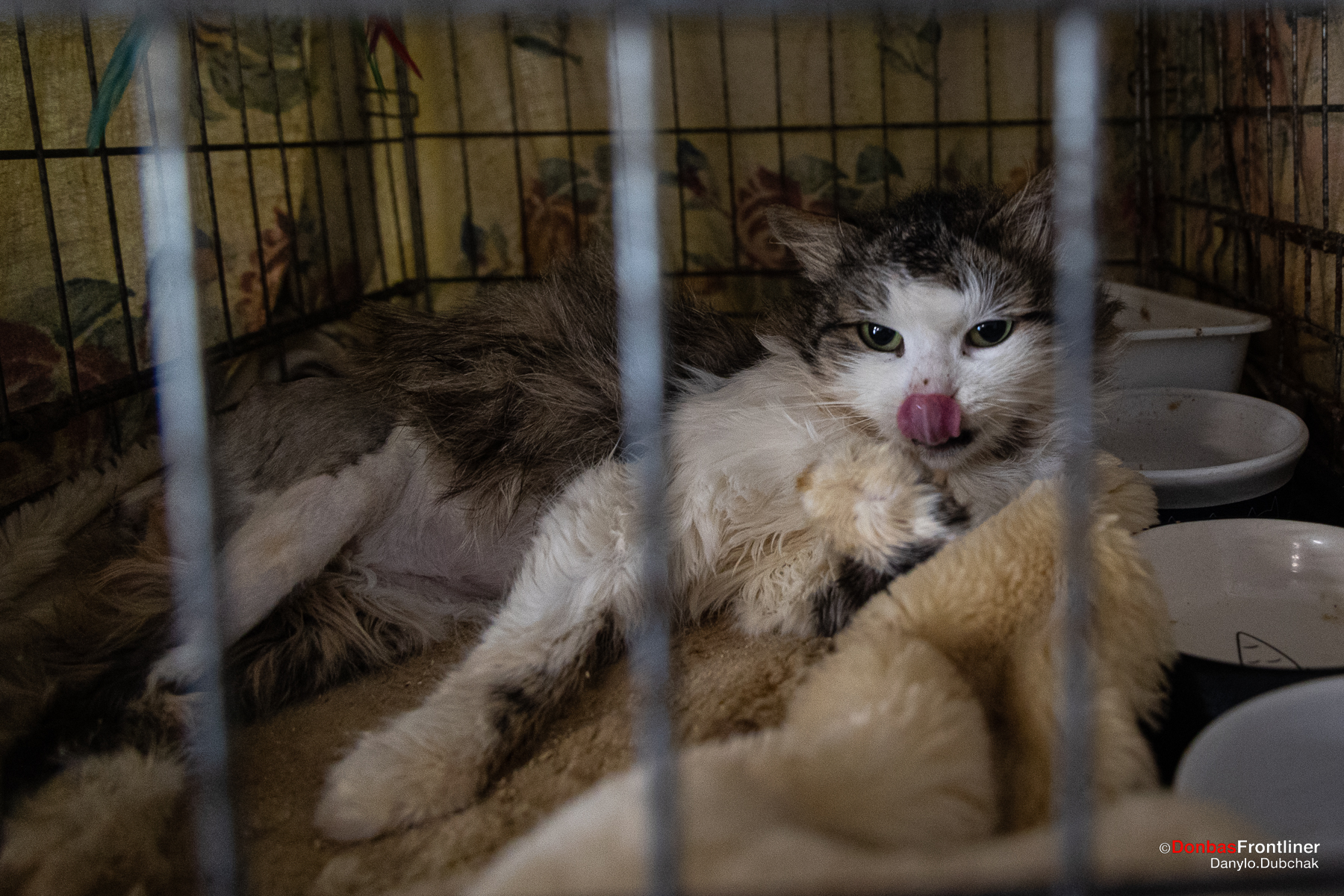
Sirius was founded 23 years ago and is the largest animal shelter in Ukraine. About 3,500 animals live here: most of them dogs, about 200 cats, as well as three sheep, two chickens, a hedgehog, and a pigeon. In the past, there was also wolf cub, foxes, and rabbits here. This ‘Noah’s Ark’ is maintained by fifteen workers who take care of the animals, as well as six administrators who coordinate the operations, raise funds, take care of adoptions, and so on.
Over the years, Sirius has found homes for over 6,000 animals, with a total of 11,000 animals housed at the shelter at various times.
Christmas tree of invincibility
During the hostilities in the Kyiv region, Sirius survived the occupation and shelling. But some animals did not survive: seven dogs had heart failure. Three more died for the same reason later, during the missile attack on August 24, Ukraine’s Independence Day. Fortunately, there were no direct hits.
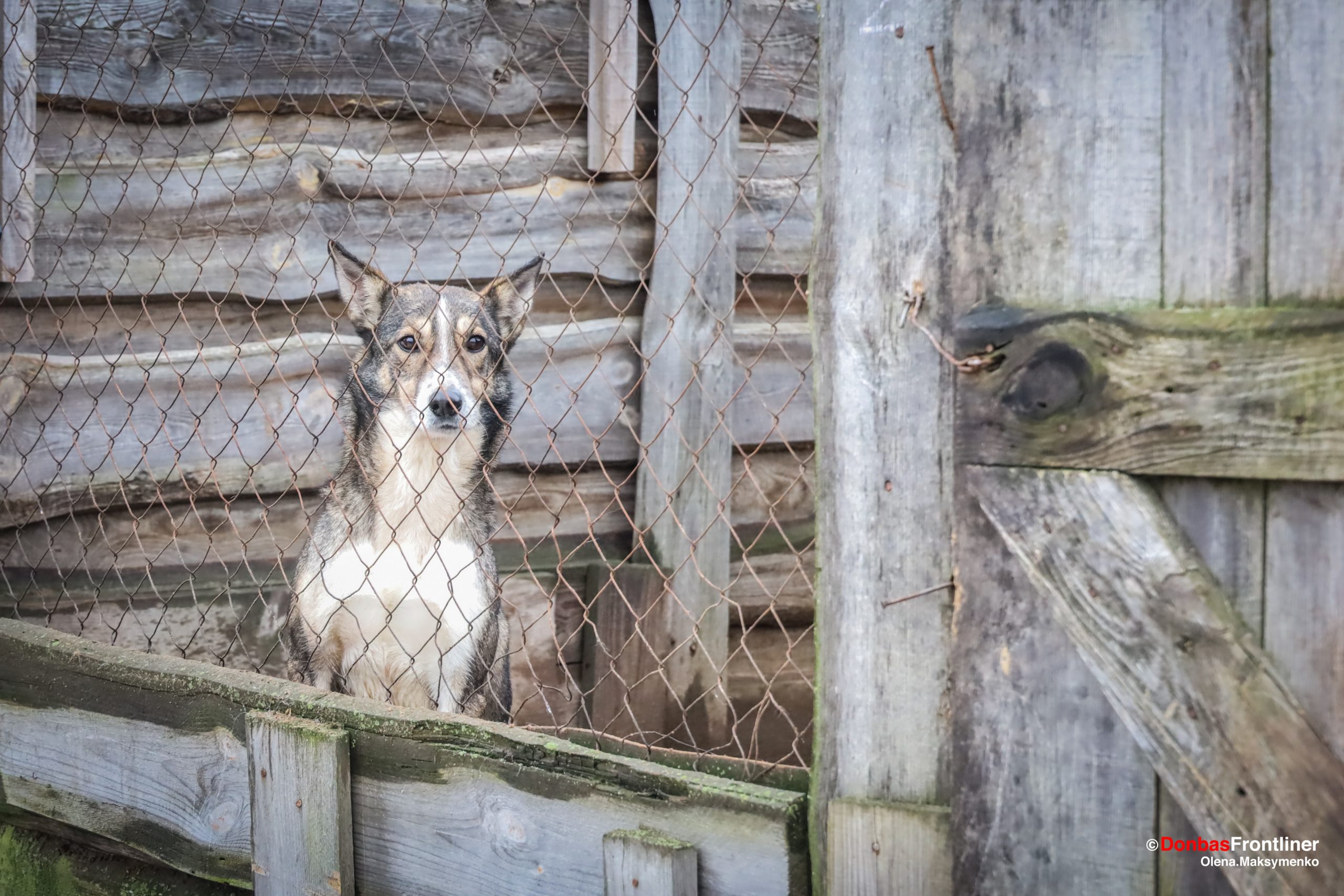
But the enclosures were also affected. “Missiles, Grad rockets were flying over our heads,” says the shelter’s owner. “Airplanes, drones. There was such a roar and whistle… Then military convoys drove in—also a terrible sound. Explosions, and so on. The dogs were terrified. They were so stressed that they tried to escape, trampling everything in their path. They tore the wire mesh and hurt themselves. Many enclosures were old and tore easily. So we urgently needed to repair them or build new ones. After the liberation, volunteers from different cities and countries rushed to us with animal food. We did not need to buy food for the animals. So we saved the donations for a few months to build the new enclosures.”
The story of each resident of this shelter is a concentration of pain and a mystery at the same time. Against all odds, the animals are alive and cared for, and some have even found new families. A full-scale war has added new ‘storylines’ as most animals end up here because of the hostilities. Soldiers, volunteers, and journalists bring them here from the front lines. Some animals are brought here from the liberated cities. Some became ‘orphans’ after their owners died. Bucha, Borodianka, Irpin, Mykolayiv, Chornobyl, Toretsk… Now the shelter is expecting ‘new arrivals’ from Bakhmut.

We visit the shelter on Sunday for the open house. On weekends everyone can come and help. There are all kinds of jobs: feeding animals, cleaning the enclosures, and walking the dogs. Volunteer photographers take professional photos of the animals so it’s easier to find them new homes.
A Christmas tree of victory stands next to the gate. It has been here since the end of 2021. “We were supposed to dismantle it at the end of February last year, but we did not get the chance,” says Oleksandra. “When our soldiers came here after chasing away the Russians, they were surprised to see the Christmas tree. And we told them, “Usually we dismantle the tree at the end of February, but this year we had other problems… But we’ll do it, it’s embarrassing, it’s already April.” And they said, “No, leave it here as a symbol. You’ll dismantle it after we win.” So the tree is still here, waiting for the victory.”
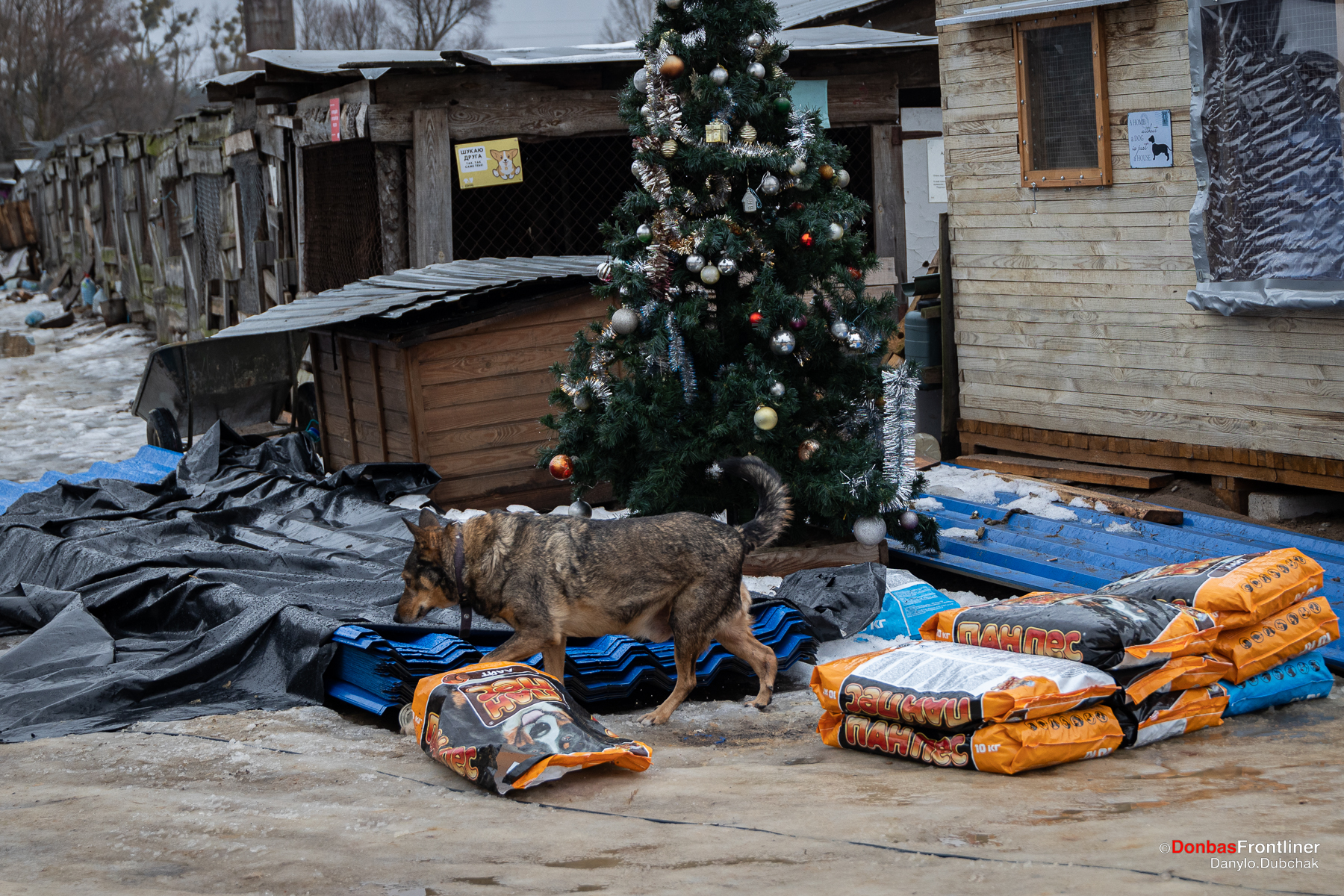
Most animals live in enclosures. Some dogs roam freely or live in kennels. Sick and weak animals remain inside the building, where they are cared for and receive medical attention. Old animals have ‘apartments’ in the building—with sofas and heated floors. Cats also have their own space. The shelter is also planning to build a baby animal shelter.
“Volunteers built this enclosure themselves for three old dogs they found,” Oleksandra says, showing us around the building. “When it gets cold, you can take these things down. We call it a ‘Christmas enclosure’.”
A cat house is under construction. The frame is up, but work has been put on hold due to lack of funds. The plan is for a hundred cats to live on the second floor, while the second floor will be set up as a hostel for volunteers from abroad.
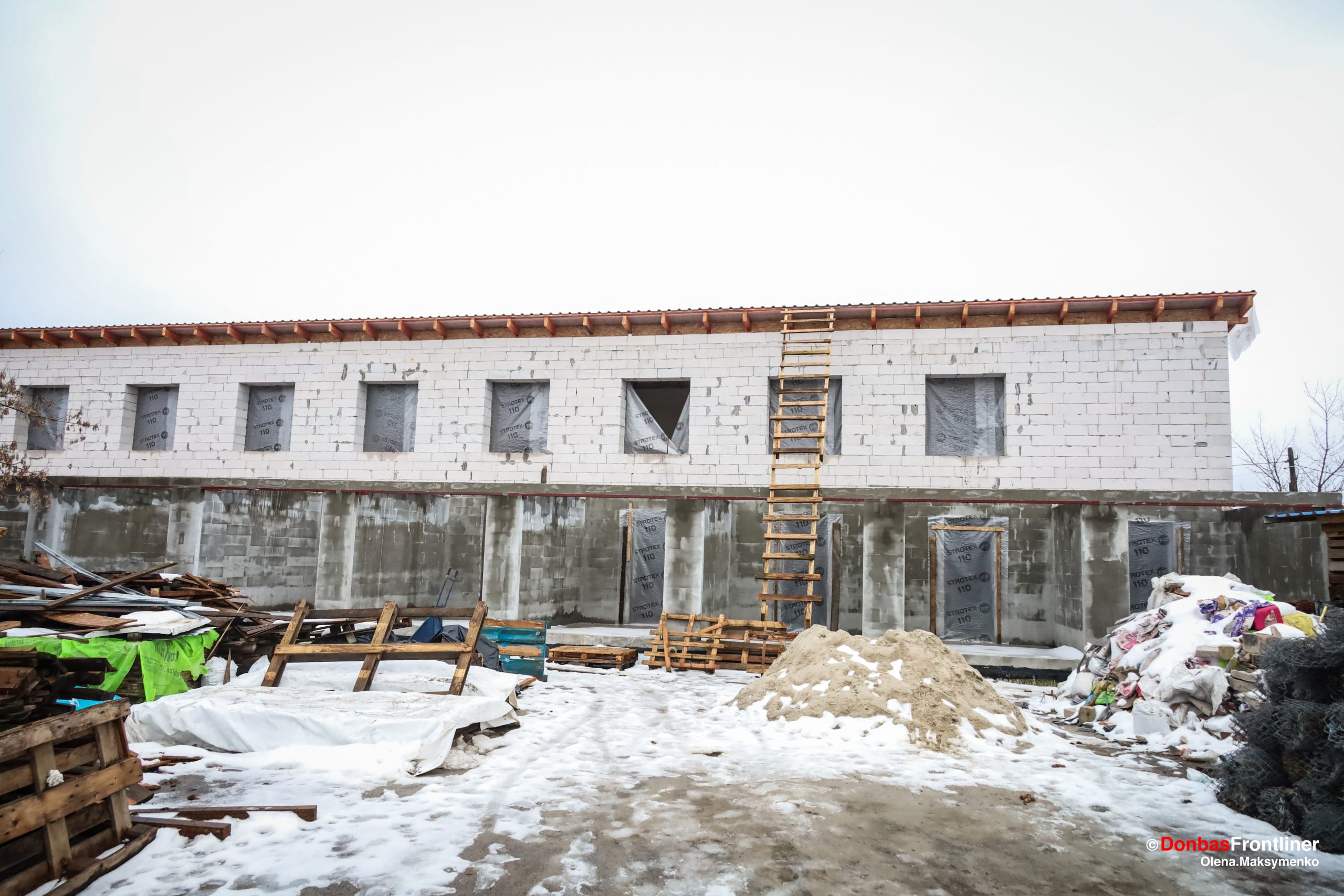
In the village, there is a hostel for the shelter workers.
Oleksandra says that the cost of running the shelter is enormous. It used to be one and a half million hryvnias a month, now it is two or even two and a half million. They need two tons of food and three to six tons of water daily. During power outages, the generators kick in—sometimes consuming twenty liters of fuel per night.
All animals must be vaccinated and neutered. Also, people with low incomes can bring their pets to the shelter every Tuesday and have them spayed or neutered for free.
Currently, the shelter manages to find homes for around thirty animals per month. Before the full-scale invasion, this number was about the same because of Covid, but in the better times, they were able to find families for a hundred animals each month. They do not give the animals away to just anyone who comes forward first. They first have a conversation with the potential owner. “We try to find out what exactly someone needs,” Oleksandra says. “For example, we ask them if they like to walk a lot or not. Because it would be a disaster if we gave a Doberman to someone who always feels tired or likes to lounge on the couch… So we take that into consideration. We also take into account the financial situation of the person. And now, another obligatory question: are you ready to leave immediately together with your pet when a zero hour comes? It is obligatory to sign an agreement. And we do not give the animals away forever—we place them in foster care. That’s in case a person is not able to take care of the pet.”
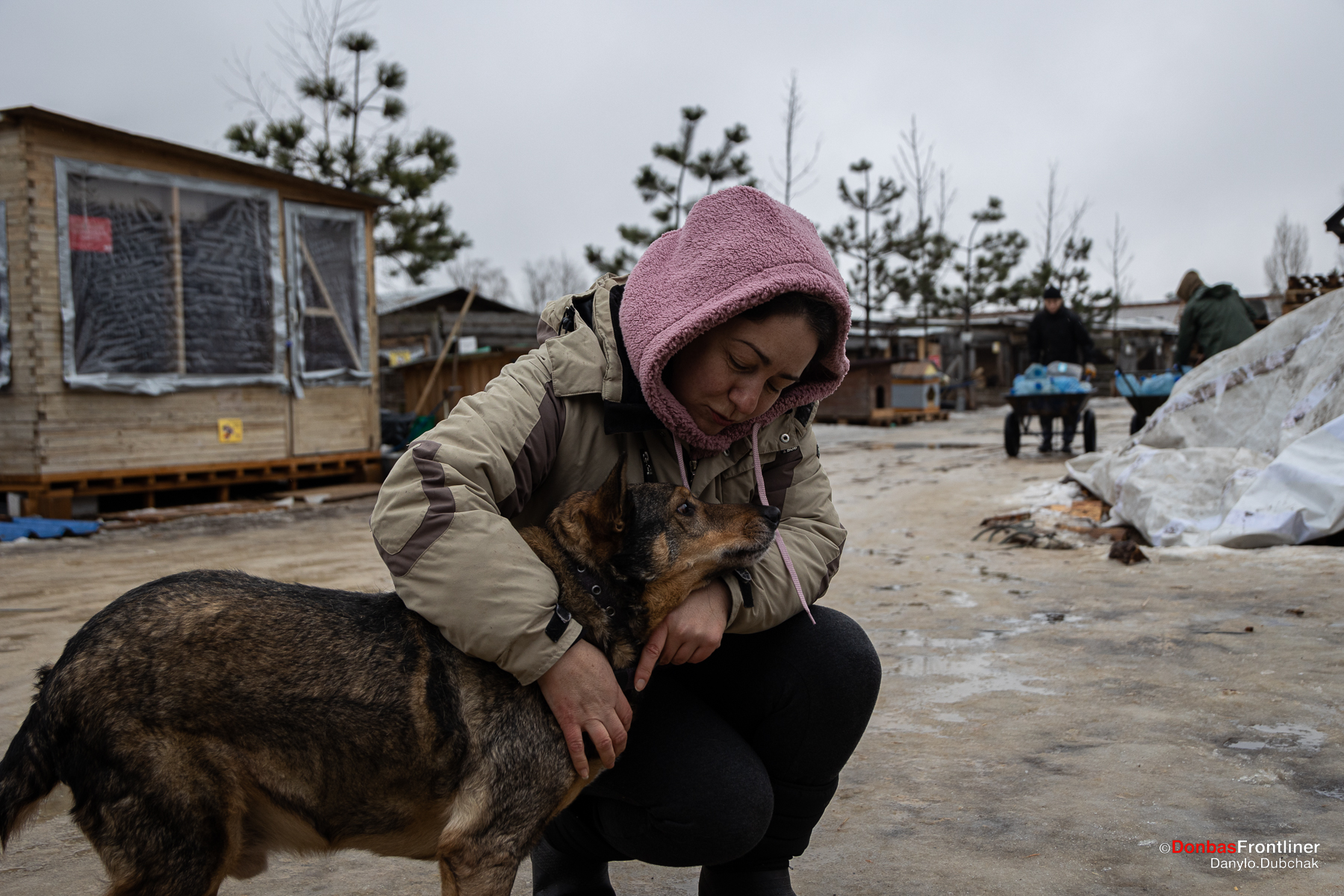
Adopters receive recommendations and contacts of animal psychologists, dog trainers, vets, or other professionals who can help them. They can also contact the shelter with questions. “And we have a clause that says that in case of force majeure, the adopter can take the animal back,” Oleksandra says. “I tell everyone not to be afraid that we will lecture them. We will take the animal back. And, of course, we also educate the new owners because not everyone understands that they should have their animal spayed or neutered. So we clarify all those details first, and only then do we let them have the animal.”
The agreement calls for owners to send photo and video reports of their pet’s life. These reports become a source of joy. Like the photo of a dog found wounded on the highway and now posing for the camera on the beach in California. Many animals brought from the liberated cities were adopted by foreigners.
“We’re so happy when people adopt one animal and then come back and adopt another one,” Oleksandra says. “Or when the animal dies, and people come here again to adopt a new pet. We’re happy when animals with disabilities or old animals are adopted.”
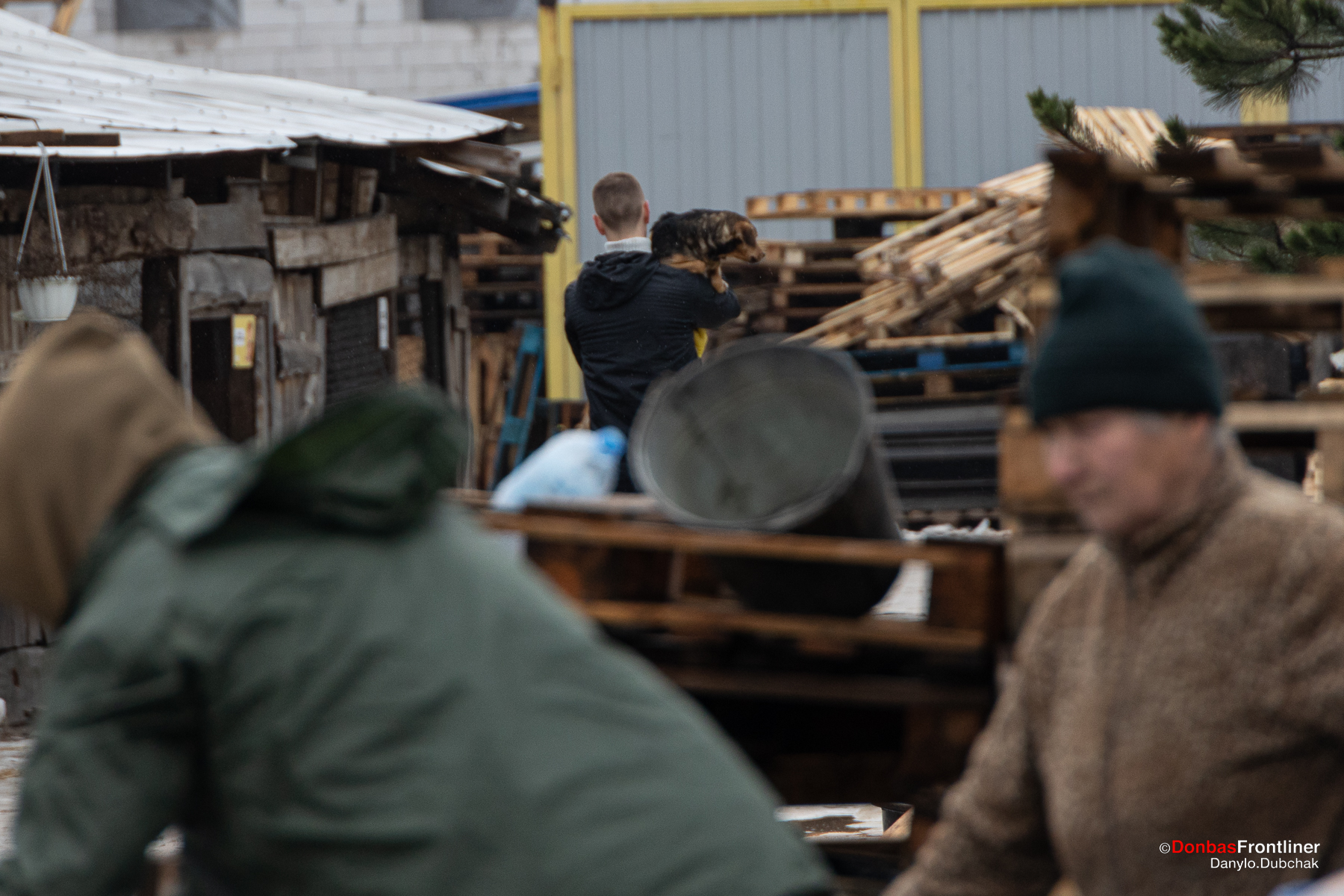
Pet chronicles
There is wild barking on the grounds of the shelter. We almost have to shout to hear each other near the enclosures. The dogs are doing their best to get attention. Most of them bark, and some even jump on all fours and spin in the air. If even one dog starts howling, the others join in—and the effect of those thousands of howling dogs would make any director of horror movies green with envy.
“Eleven of our dogs are fighting in the Armed Forces of Ukraine!” Oleksandra proudly says. She greets the animals under her care as she walks past the enclosures, “Hello! How are you?”
“These are from Mykolayiv,” she says, referring to the inhabitants of one of the enclosures. “They arrived safe and sound, thank God, but terribly stressed. We have organized psychological rehabilitation for them. One of our volunteers is taking care of that. And this ‘nursery group’ came from the Donetsk region—soldiers brought them.”
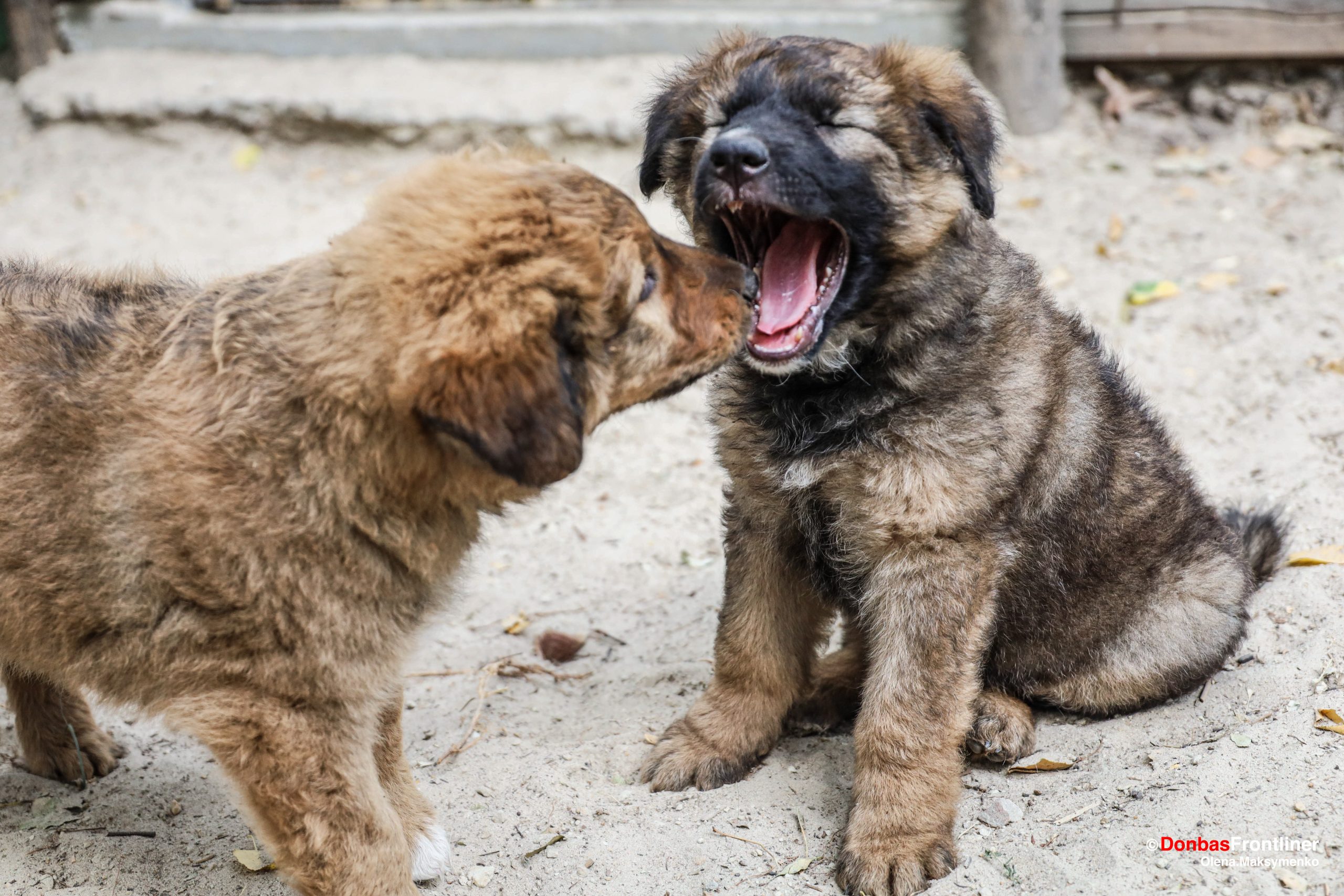
In the next enclosure lives a sad Alabai.
“This is Umka,” says Oleksandra. “A good girl. She lived in the factory area. Then the Russians came. They beat and shot the dogs because they were guarding the compound.”
Several dogs were killed. Umka was wounded. She still has a fragment of a bullet in her back. Her cheek was torn open.
“She fell into a ditch and lay there for a while during the occupation. That’s where our guys found her and called us,” Oleksandra recalls. “So we took her in. Her muscles had atrophied, and she could not walk at all. She’s an older lady and spent a long time in the clinic—first one, then another. Now we walk her three times a day. She needs to get some exercise. That’s all we can do. They beat her brutally. Little Uma, my dear daughter…”
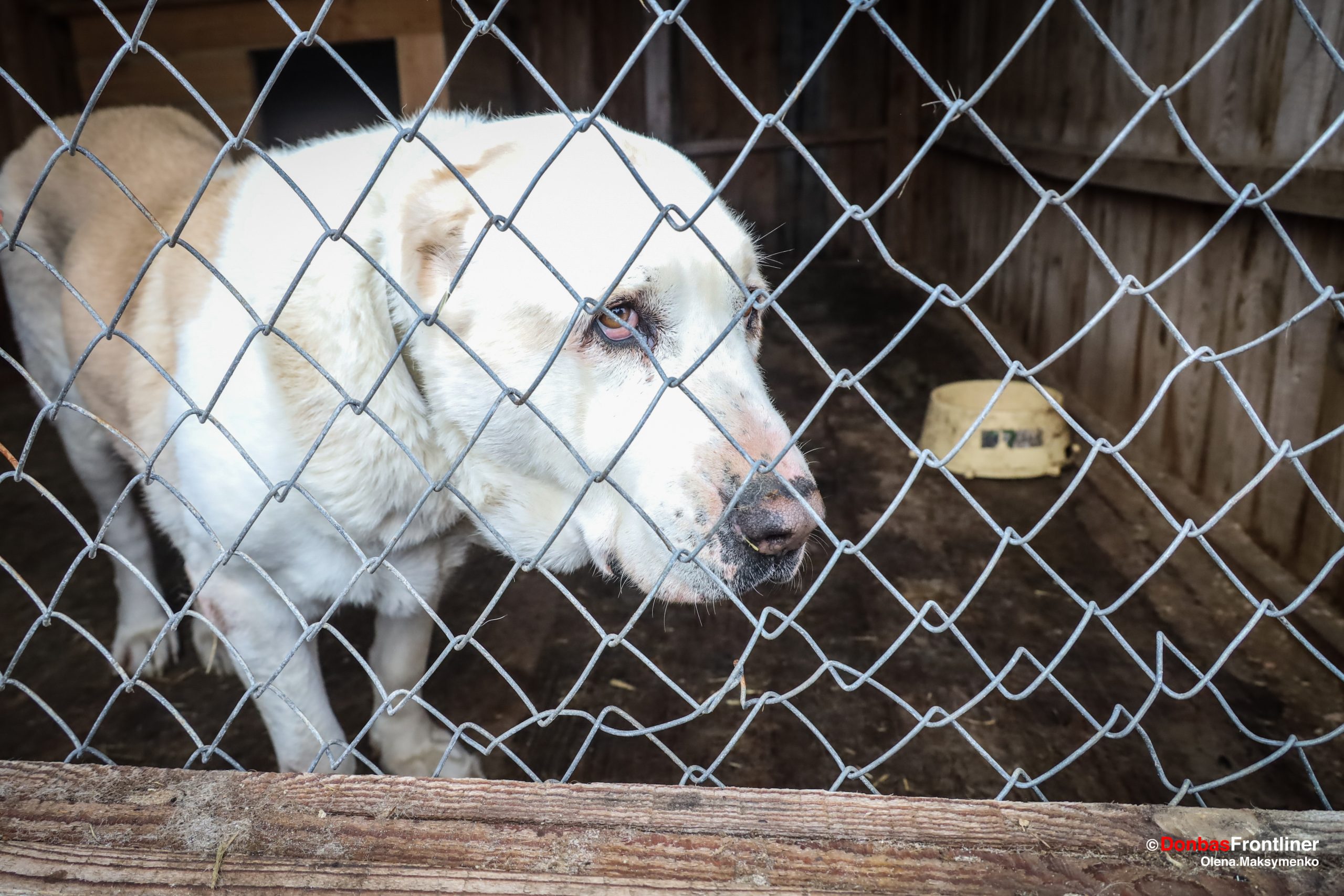
In another enclosure live three sheep. Dasha, Dana and Nichka. Dasha came from the Borodianka district. “The people fled and left their sheep, rabbits, chickens, and the shepherd dog behind,” says Oleksandra. “The dog ate the rabbits and chickens, while one chicken, one rabbit, and one sheep survived. I don’t know what happened to the other sheep. The neighbor of these people, a retired woman, picked up the three animals, and I later brought them all here. Together with two sheep from the Zhytomyr region. Actually, we wanted to take only one sheep to keep our ‘girl’ here company. But they led two sheep outside and told us to choose one. So I wondered what would happen to the other sheep. Surely, they said, they would just eat it… Of course, I said, I would take both!”
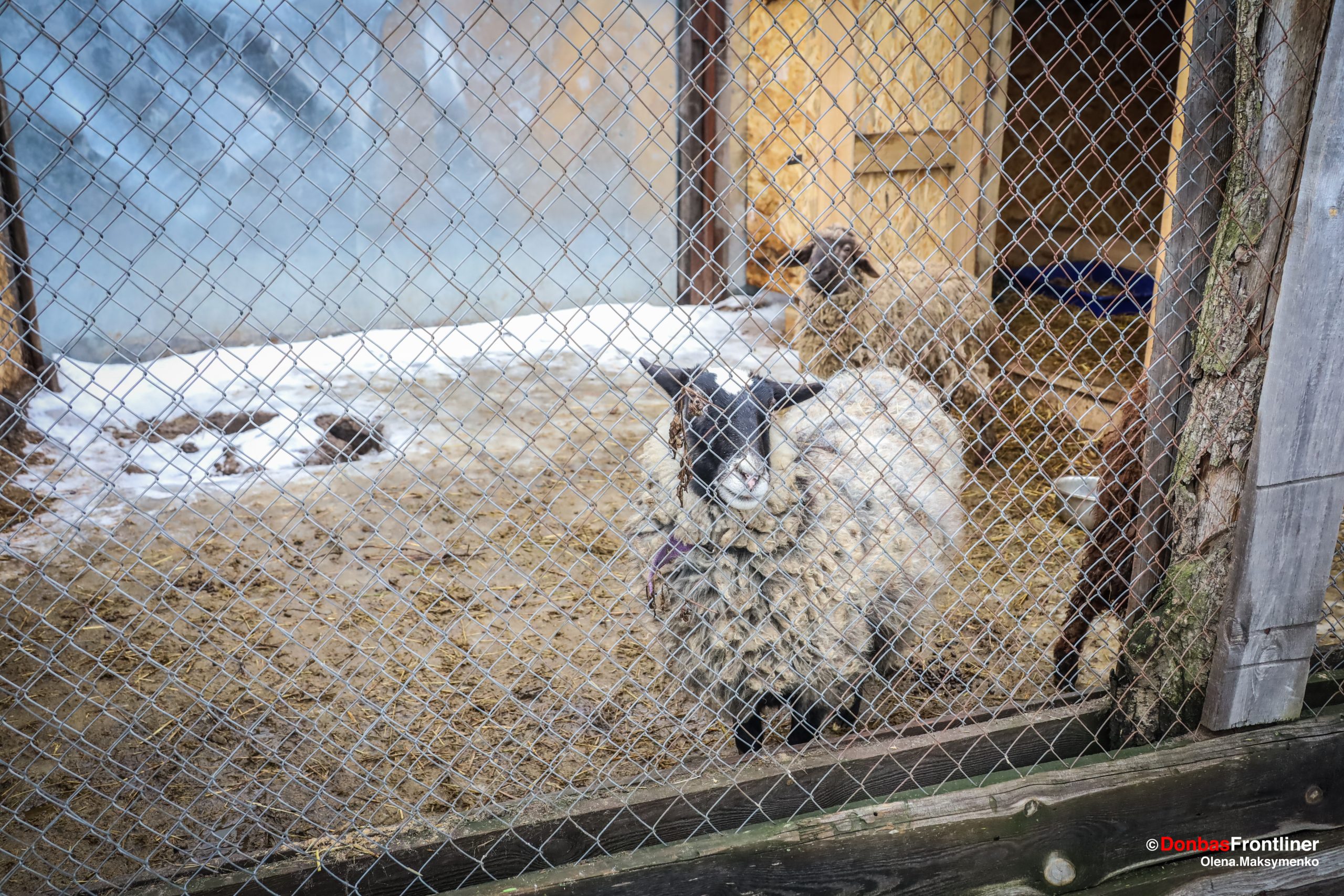
They have already bought the shears to shear the sheep in the spring.
Halyna, the chicken, comes from the same household as Dasha, the sheep. Along with another chicken, Bella, she spends the winter in a cage in a room with cats.
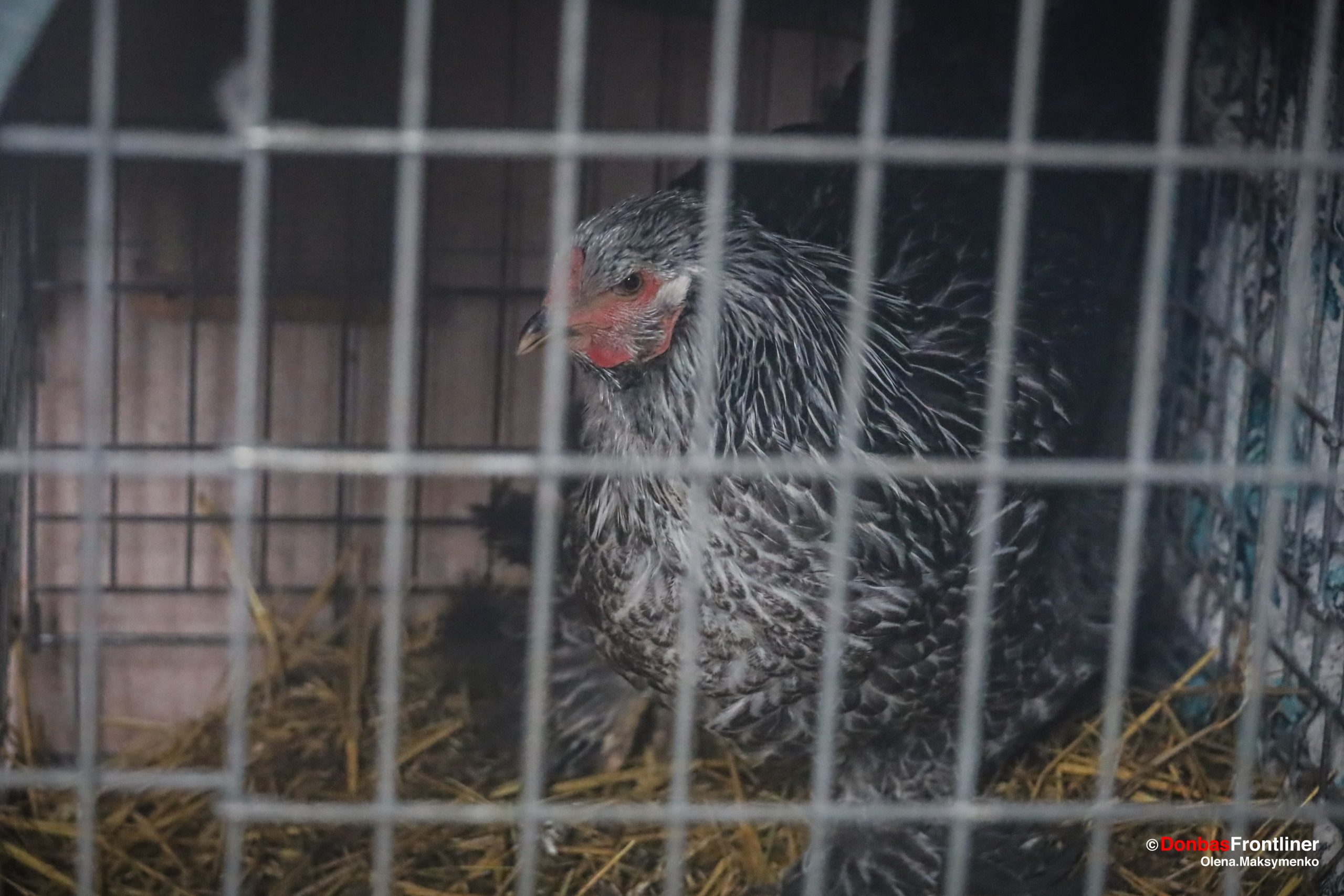
The four puppies are called ‘bear cubs.’ Soldiers brought them out of the positions when they were just two months old. They said they were born on the same day as Valeriy Zaluzhny, commander-in-chief of the Ukrainian armed forces.
If the occupiers in Fedorovychi were not prone to excessive cruelty, the neighboring village of Kozarovychi and the villages outside Chornobyl were less fortunate.
“So many dogs from our shelter were adopted by people in Kozarovychi,” says Oleksandra. “We were stunned by all the missiles, Grad rockets, and the noise because we knew that Kozarovychi was bombed. There is a dam there, so there was heavy fighting. Later people came to us and asked for new dogs because the ones they had adopted before had been shot. The Russians just threw grenades into the yards. They shot dogs that were kept chained. They shot them in enclosures. Russian Asians ate them…”
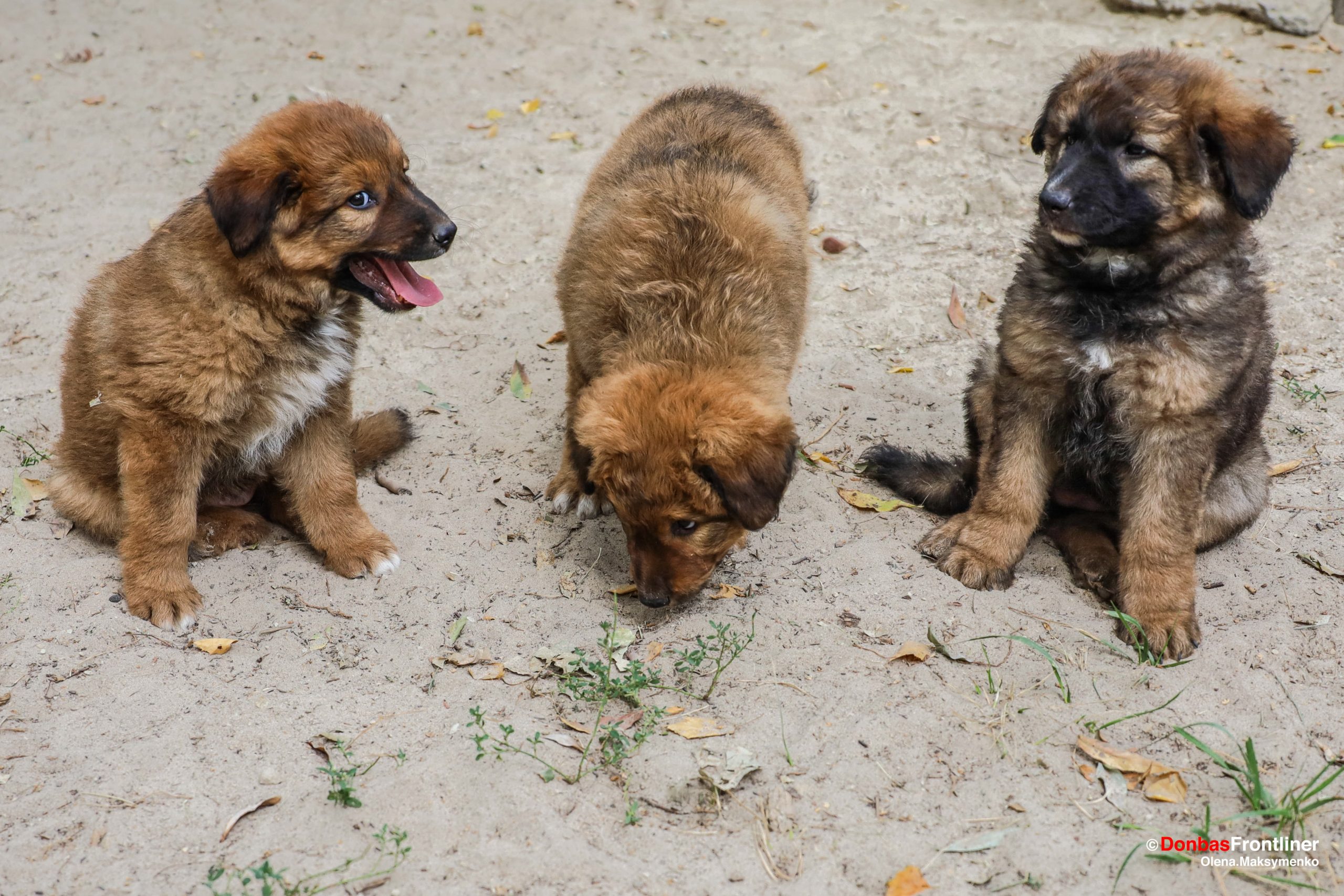
Some animals have ended up in shelters because people are mean, not because of war.
“This is Polamash,” Oleksandra says, petting a well-fed, limping dog that nestles at her feet. “A company kicked him out. It was raining that day when a woman called me, crying, to tell me she had found a dog that was shaking and all weepy. She asked the people from the company, but they just said, ‘So what? He’s old, he’s dying… ‘ We examined the dog—he had a fever and was shaking all over. The dog served this company faithfully for years. He got under the wheels many times, but no one even treated him. Why do his legs look like that? That’s the way the bones are fused… He had pneumonia, and we treated his leg, another fracture. So now Polamash is our handsome boy, so chubby. He was so skinny then, and now he just can not stop eating.”
“This ‘girl’ is blind,” she continues. “She had puppies right after the occupation. She’s a Lab mix. Her owner was so stressed that she died after the liberation. Then Emi ended up at our shelter.”
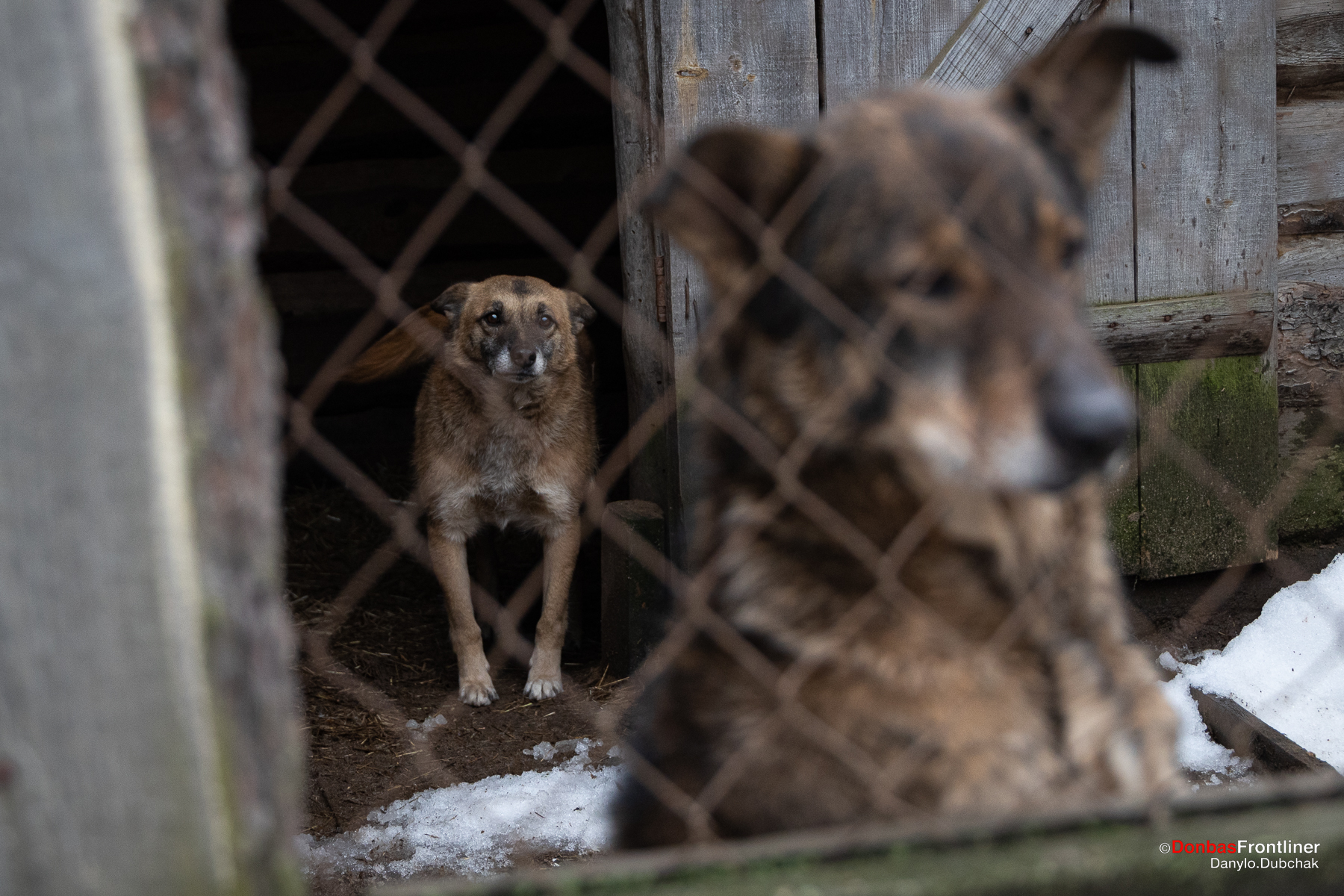
Although the shelter is full and officially does not take in animals, ‘kind-hearted’ people dump off puppies or kittens in boxes or bags at the shelter’s door almost every day.
“This cat was kept in a concentration camp,” says Oleksandra. “Before the war, there was a woman who had a ‘great’ idea. If your relative died and had a pet and you did not want to adopt it, you could pay her 8,000 hryvnias, and she would take it to live in what she called ‘luxurious’ conditions. She posted the photos of the animals on the sofas. So people gave her the pets. And she had a one-room apartment full of cages. The cages were stuffed with cats and dogs… The stench was unbelievable. Tenants were moving out of the apartments next to her because the urine was literally leaking out. Once a week, she would come with bags and collect the dead bodies. At that point, she had 48 animals with her. We removed 18 dogs and 16 cats, and volunteers took the rest. This cat was there. She was traumatized. It was like a Buchenwald…”
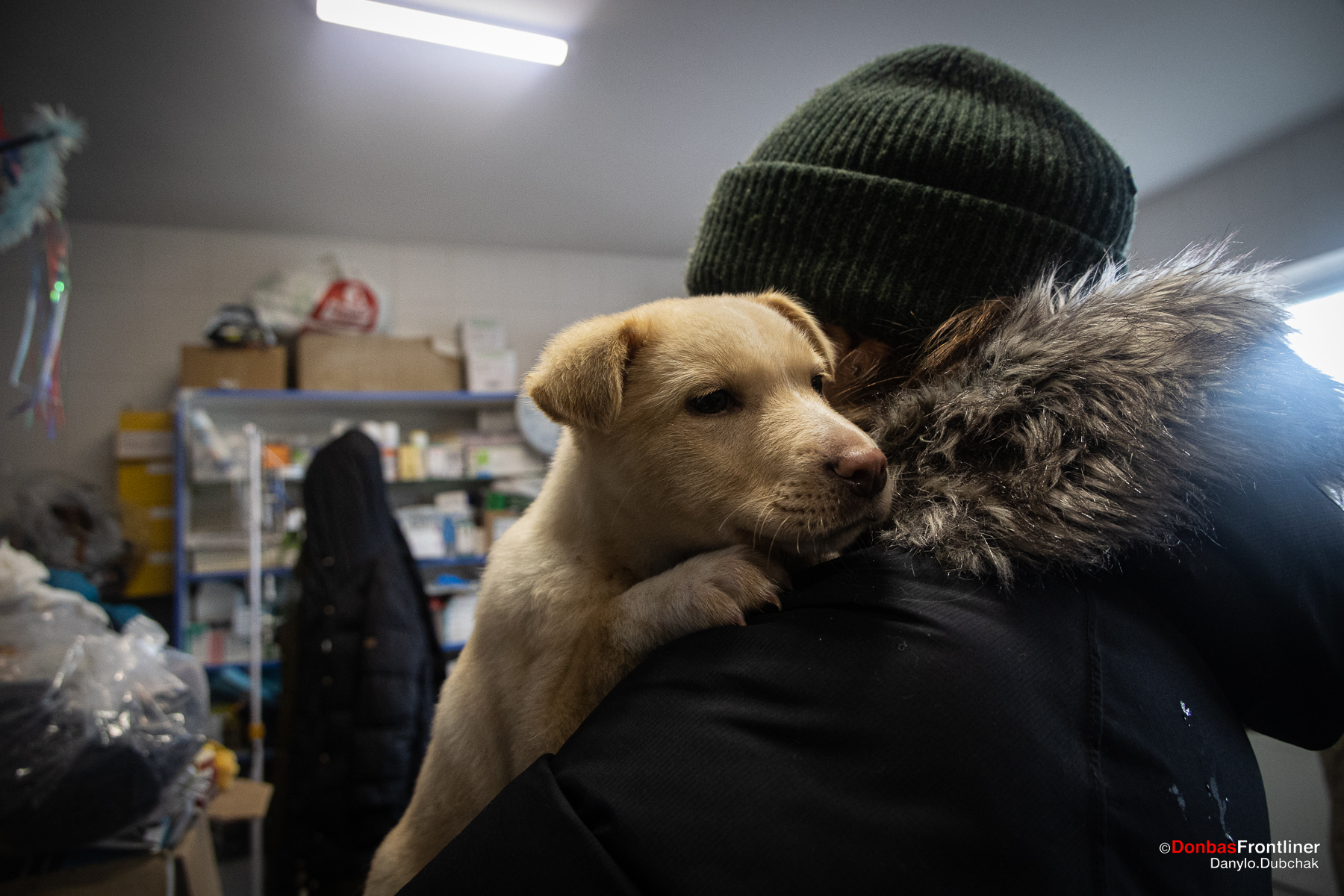
The walls in the apartments for cats and older dogs are painted bright yellow. Oleksandra says this cheers them up. Unlike the dogs, the cats greet visitors with reserve. Most of them watch us silently from their shelves and cots. The most curious ones approach us cautiously. The boldest cat jumps on my neck.
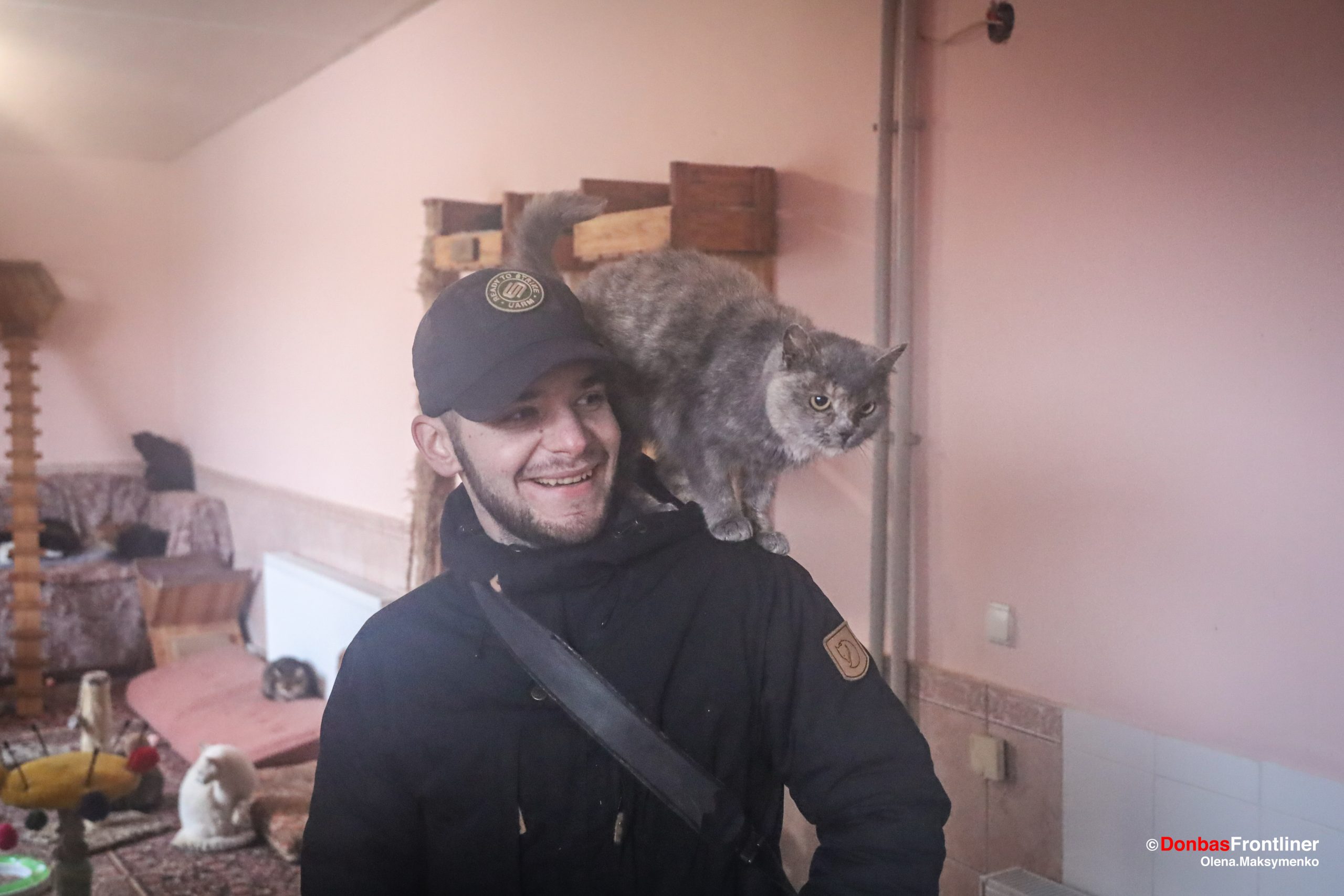
“I was afraid of how each day would end”
“When the Russians marched in, a group of people with machine guns rushed in here,” Oleksandra recalls. “There was dead silence. The dogs were silent. And you heard how loudly they barked, didn’t you?! The village thought they had been shot.”
When the Russian political instructor entered our compound, he asked, “But how many animals do you keep here?!” Oleksandra told him the number.
“So this is the largest animal shelter in the Russian Federation!” he summed up.
“No, no, in Ukraine!”
“Well, time will tell.”
“It will, for sure.”
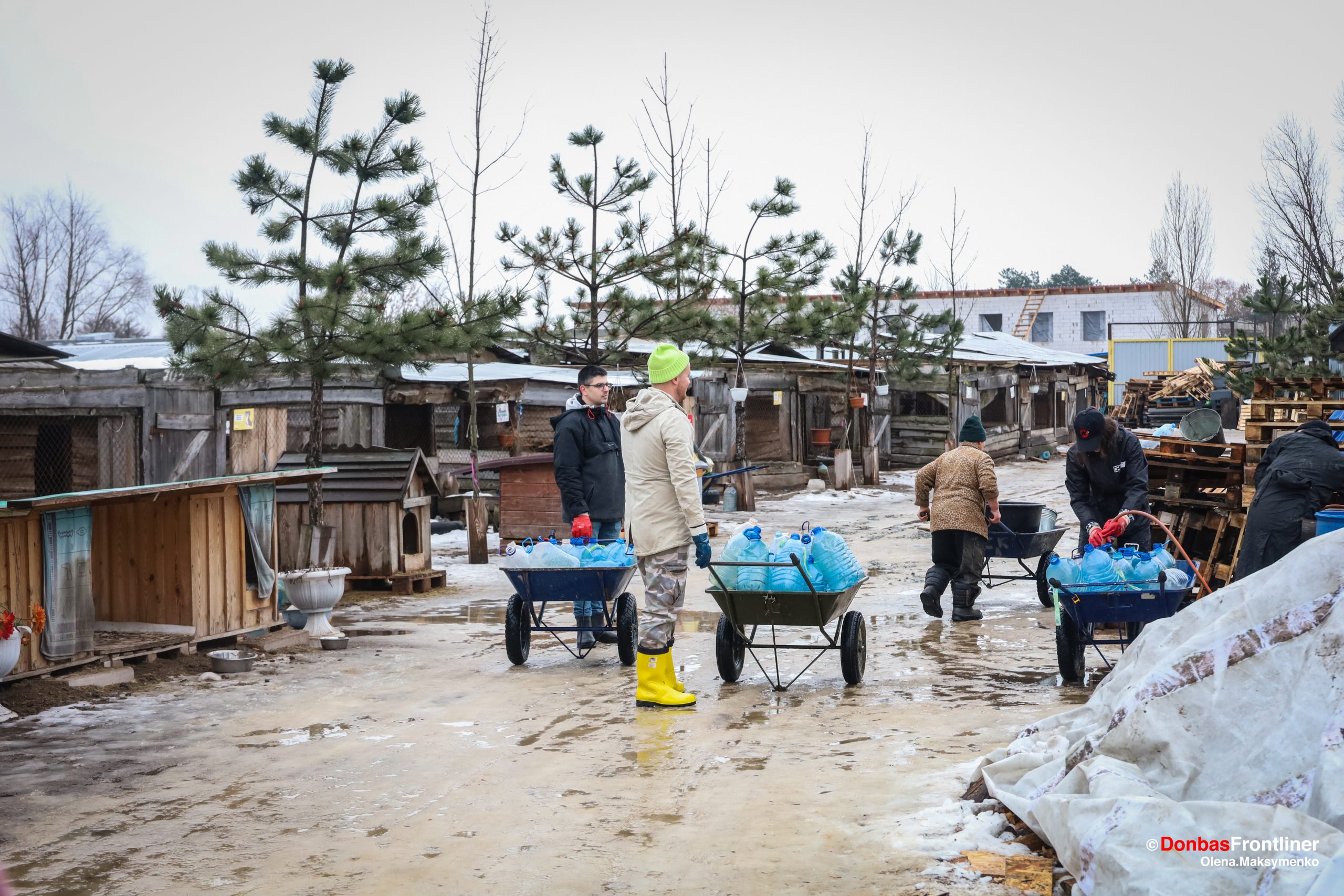
When the village was occupied, Oleksandra herself went to the Russian soldiers and said she wanted to speak to the commander.
“We need to know what we can and cannot do,” she said, “what the rules are, if there’s a curfew, and so on.”
When the uninvited guests first came to the shelter, they gathered all the staff and shot their cell phones—so they could not inform them of their location, the soldiers said. The staff tried to explain that there was no cell phone signal in the area anyway, but they would not listen. Later the Russians came and looked for ‘Ukrainian saboteurs’ or ‘foreign legionnaires.’ But they did not hurt animals or people.
“The most frightening thing about the occupation was the absence of doctors,” admits the shelter’s owner. “I was so afraid that something would happen and we would urgently need the help of a surgeon, for example. I told you about the dog that hurt her leg trying to break out of the enclosure. But we got that under control…”
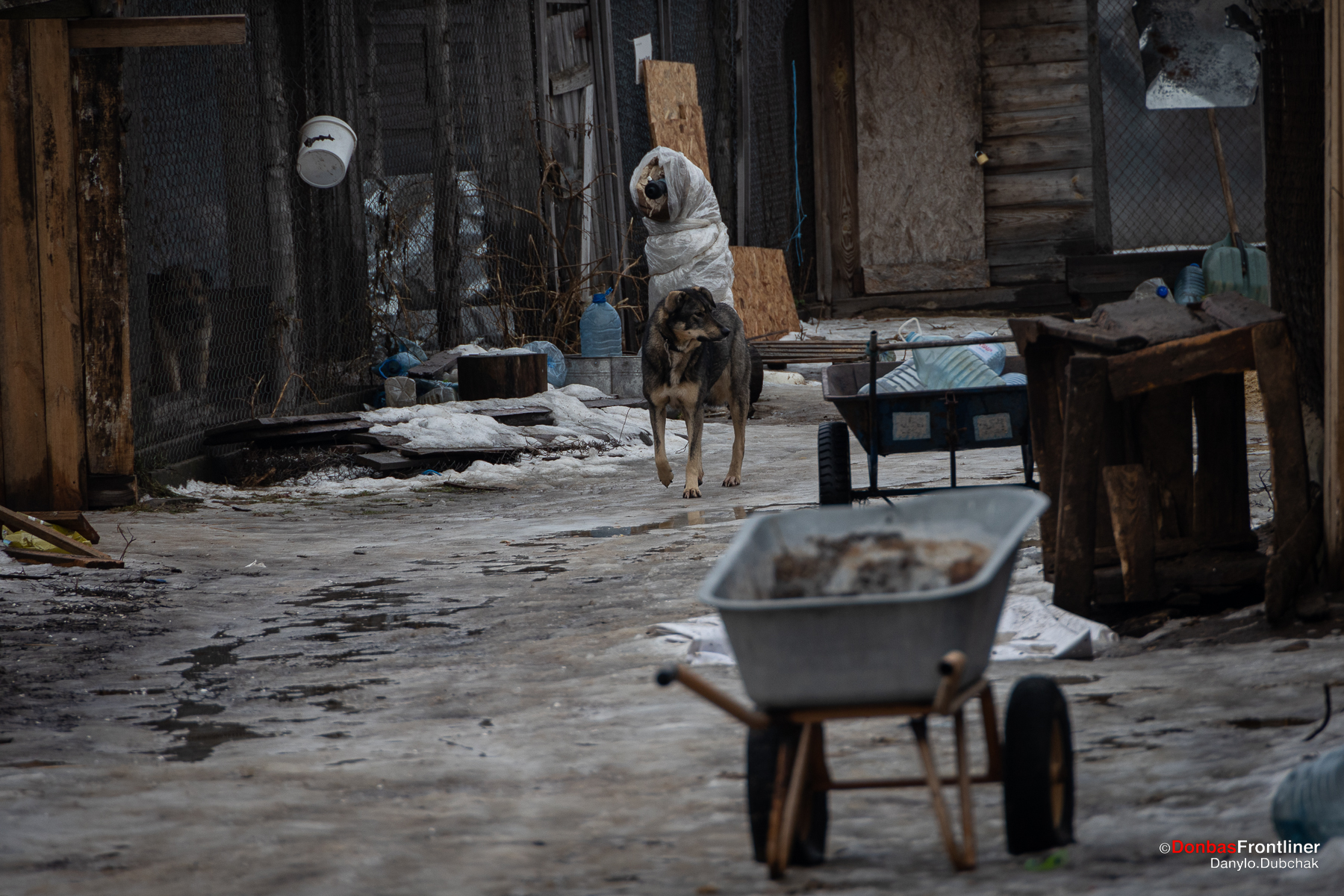
Feeding the animals was another quest. They cooked soups.
Oleksandra says, “I got potatoes, carrots, onions, corn on the cob. At first, there were some grains and noodles, but then there was nothing—empty grocery stores, everything was closed. The locals barely helped us. Someone was selling grains and potatoes for crazy money—they just ripped us off.”
The shelter received help from the neighboring village of Dymer. People brought sacks of potatoes and canned food (the shelter had to feed not only the animals but also the employees)—free of charge. “They gave us everything they could, including jam and pickles,” says Oleksandra. “I brought everything to our hostel. People in the village started making flour. So I bought a few sacks. We mixed some flour in soups and made dumplings for the dogs. People were baking crispbread. By the end of the occupation, everyone was as thin as a skeleton.”
Every day they had to pass Russian checkpoints to get food and gasoline for the power generator. Each time, the Russian soldiers claimed that a different neighborhood in Kyiv had been occupied. Sometimes they asked them for cell phones to call home. “But you shot all our phones!” Oleksandra said to them. “You do not shoot the phone first and then ask for it to make a call!”
However, they took care of the abandoned dogs and even offered food to the shelter. Oleksandra refused. Sometimes she let her guard down and scolded the soldiers about the poor condition of the dogs at the checkpoints.
“Their commanders ordered them to leave the shelter alone,” she claims, “and they were supposed to keep their hands off the local dogs. They were allowed to feed them, though, so the dogs were fine. They brought them to us before they retreated. We have already returned the dogs to their owners after they came back.”
Some occupiers looted. Some drove tanks against the gates. Mezynina did not remain silent but sought out the commander: “‘You talked so much about ‘liberators’ and about ‘coming to liberate and protect you,’ I told him. ‘And now that you are here to ‘liberate’ us, why are you driving into people’s fences? Why are you breaking their windows?’ And he told me, ‘All right. I’ll tell the guys not to do that.’ Then he met me on the street and said, ‘Show me the households they took the cars from.’ I’d like to give them back and apologize.'”
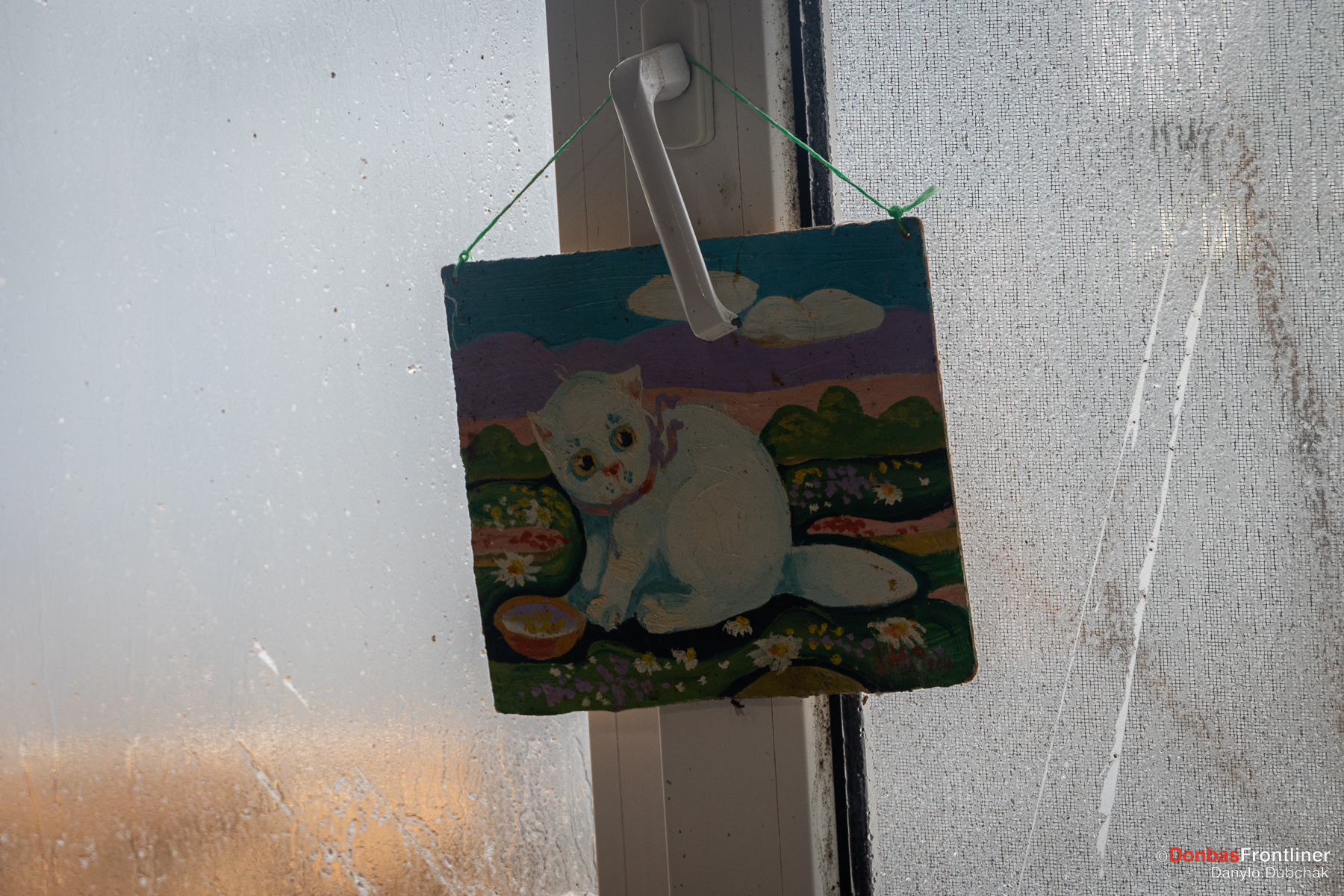
It was scary when the occupiers were drunk or high. They then became more aggressive. This usually happened in the afternoon, so the shelter staff tried not to go outside at that time. The Wagner mercenaries were the most dangerous. Once Oleksandra and her assistant went to get the meat—a refrigerator was broken, and its owner gave away the half-spoiled meat. On the way back, they passed the Russian checkpoint without any problems—the soldiers already knew them well. But then people in black pounced on them. Mezynina remembers:
“They were very aggressive and told us to unload everything. And I said, ‘Are you crazy?!’ We had four tons of grain and meat. The meat stank, it was disgusting to load it. So I told them, ‘They already checked us. There’s nothing in there. Why do you want to see it?!’ ‘There are Ukrainian soldiers in there!’ they said. Finally, they forced us to unload everything. ‘You’ve been bombing the Donbas for eight years!’ one of them shouted. And I said, ‘First of all, this is not true, and second, was it me who bombed it?!’ [Laughs] So we unloaded all the meat. They brought our guys to their knees. ‘Or we’ll shoot you through the knees,’ they threatened. They said they would shoot us if we talked to them like that next time. In the meantime, the Russians who had checked us before had not left. They were standing with their backs to us. So I asked them, ‘What’s the problem? You’ve already checked that! Who are these people?’ And they said, ‘They are the Wagners.’ ‘So what?’ I asked. ‘I don’t care who they are. You have some rules, don’t you? Tell them something!’ And they said, ‘We do not talk to them.’ ‘What do you mean you do not talk to them?! But they are yours, aren’t they?” ‘No,’ they said, ‘they are yours.’ ‘What do you mean?’ ‘The Donbas is yours! And they are from the Donbas, so you talk to them!’”
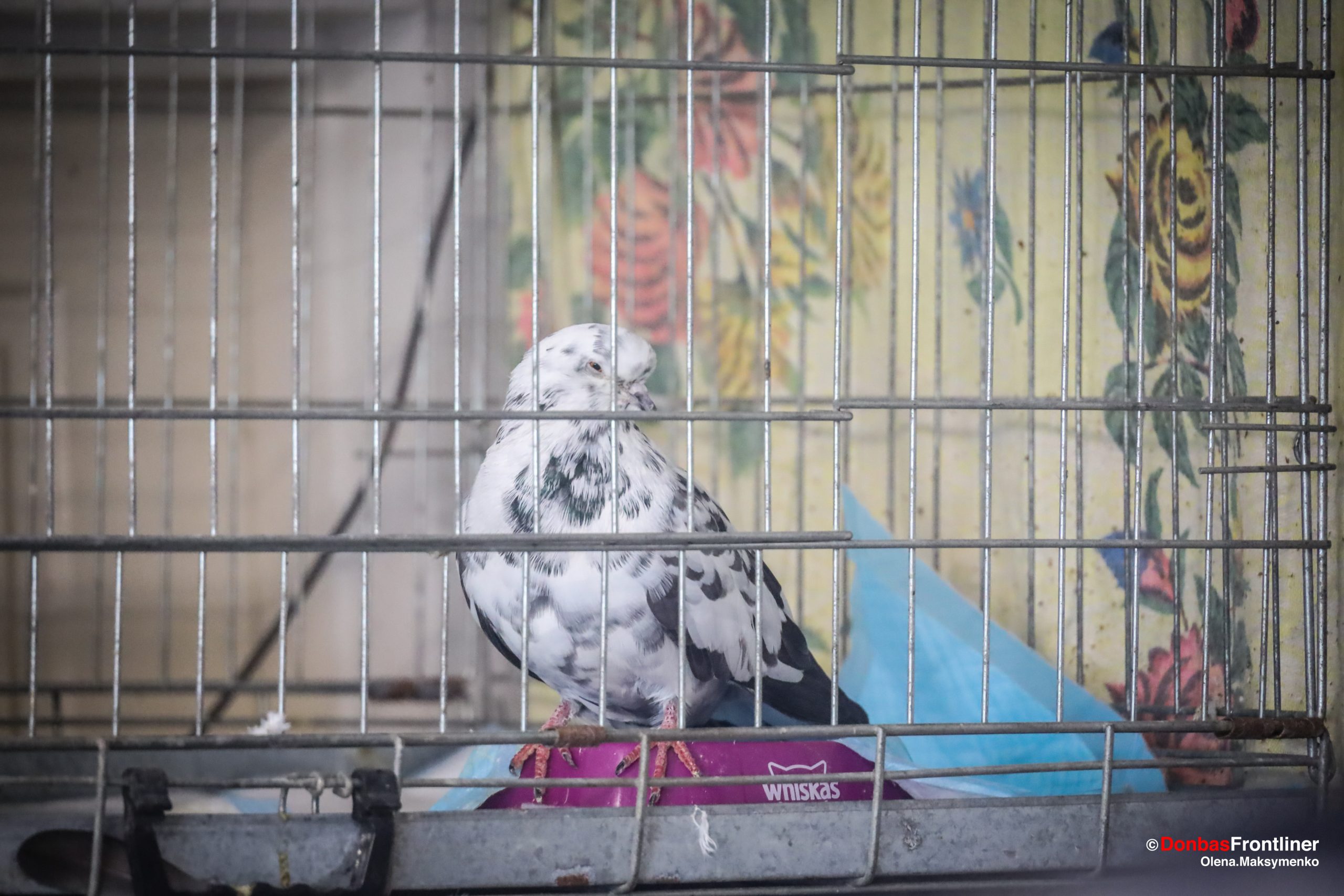
Demoralization as a weapon
There were also some philosophical conversations. Oleksandra never made a secret of her attitude, even when the people she talked to had weapons. In Dymer, a Russian major approached her and said he would like to talk frankly with her. He asked her why the young women here did not greet his soldiers with flowers as ‘liberators.’ Oleksandra began to explain. At some point, she broke off, not daring to call things what they were, and laughed.
“Why are you laughing?” the major asked. “Were you trying to say something funny?”
“Yes.”
“Well, say it!”
“When I told them later that they were occupiers and we hated them and that no one would welcome them with flowers and that we were looking forward to our victory and the return of our boys, the Russian soldiers laughed, and the major said, ‘Now we won’t shoot you for sure.’ ‘Why?’ I asked. ‘After all I have told you?’ ‘We like that you can say all that even though you know we can shoot you. It’s fun.’”
They made her test one of the Russians on his knowledge of the Ukrainian language. “It’s an F,” Oleksandra said. “Don’t talk to people like that. Well, you got the words more or less right, but your accent is wild.”
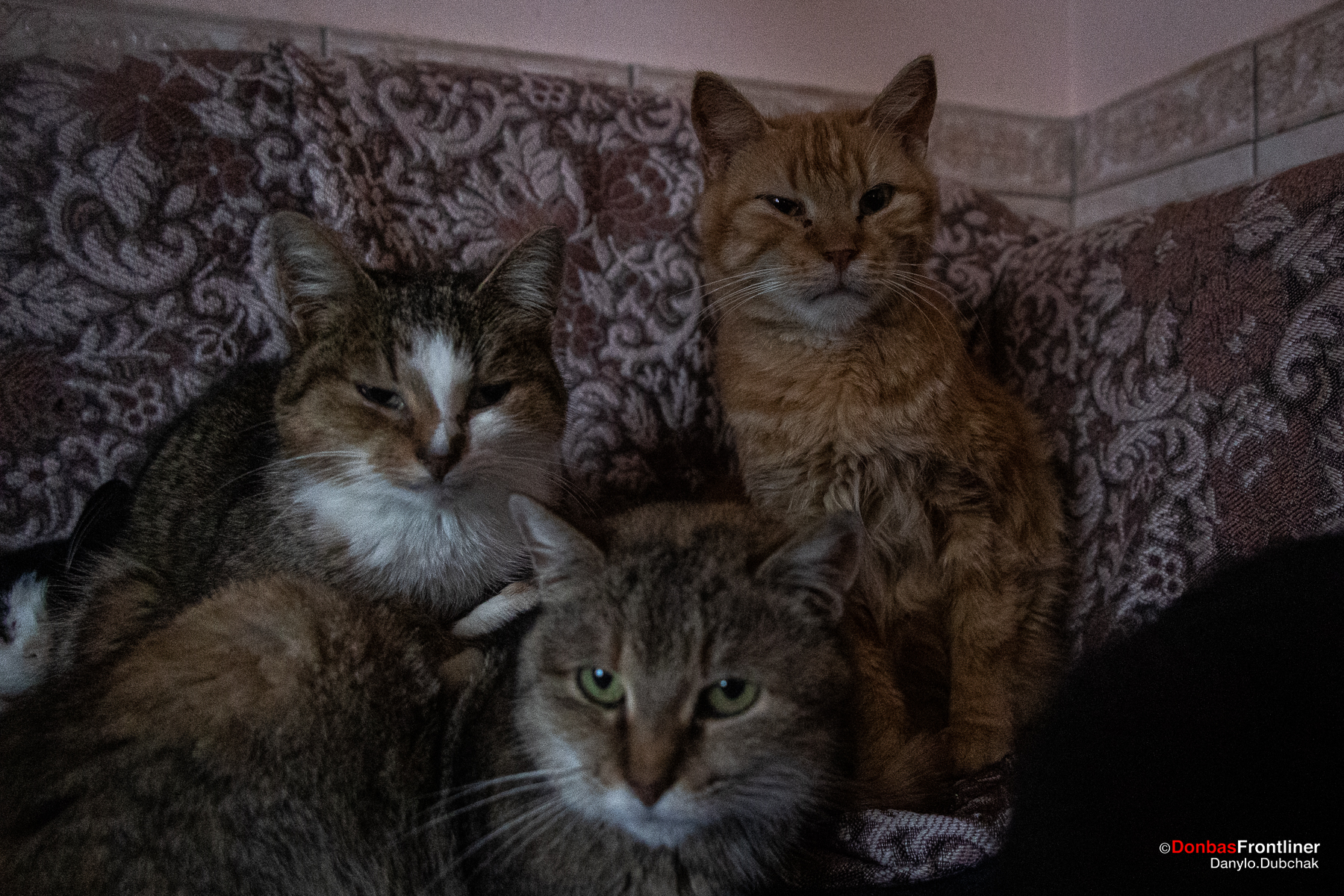
When Ukrainian soldiers fired mortars, they had to take shelter in the same basement as the enemy. The major asked Oleksandra what she was thinking at that moment. “The dogs will be hungry today…,” she said.
Once, the Russian political instructor stopped her on her way. He claimed that she was a bad influence on his soldiers.
“We know you, you seem to be a normal person, you take care of animals, but… My boys have started to have strange thoughts… That the Donbas belongs to you, that Crimea belongs to you, that you will win shortly… And that we have to surrender. What the hell is that?!” And I said to him, ‘Well… So what?’ ‘Sometimes, I even have a hard time talking to my boys! You talk to them too much!’ he said.”
Oleksandra asked the Russian soldiers how they got there. She did not believe in the fairy tale of military drills. She asked them how much they were paid. One of the soldiers, a native of Sakhalin, said he wanted to buy an apartment—he and his wife lived in a communal flat. ‘I understand,’ she said, ‘but you should not have come to Ukraine. And how much will you get then?’ So he told me the figure, and I explained inflation and all that. His morale was just shattered after he realized he was getting only 15 thousand hryvnias. I told him, ‘My people also get paid 15 thousand. But they work only with the dogs. And they live in a hostel and get free food… And you have dragged yourself to another country for the same money, where you can be killed at any moment. And your family will be left without a breadwinner. Or you could become disabled.’ He was shocked. ‘Can I work here after the war?’ he asked.”
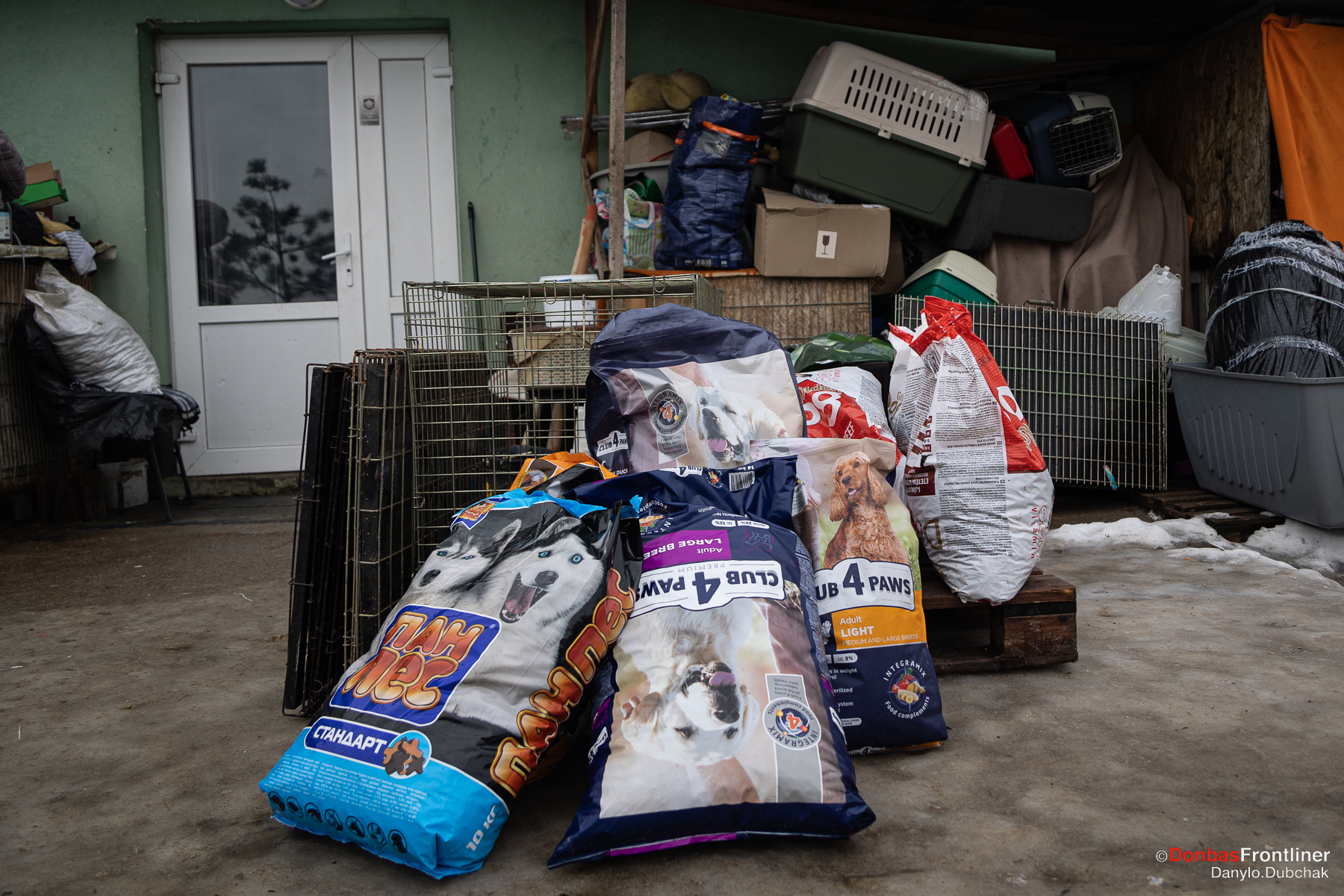
Projects and plans
Oleksandra cared about rescuing animals from an early age. Her parents had the same values—they took home sick animals and treated them. Her mother was a teacher and always found new homes for rescued animals among her students.
“Getting an animal from her was like getting a certificate of achievement,” Oleksandra says. “My sister is like that, too. She was fleeing Irpin when the tanks were already there. They were wading through the river. She has a husband, two children, two cats, and two dogs—and they still managed to drop into an animal shelter on the way and ask for another cat! They got a cat and set off together to the west of Ukraine.”
Oleksandra has three cats and three dogs at home.
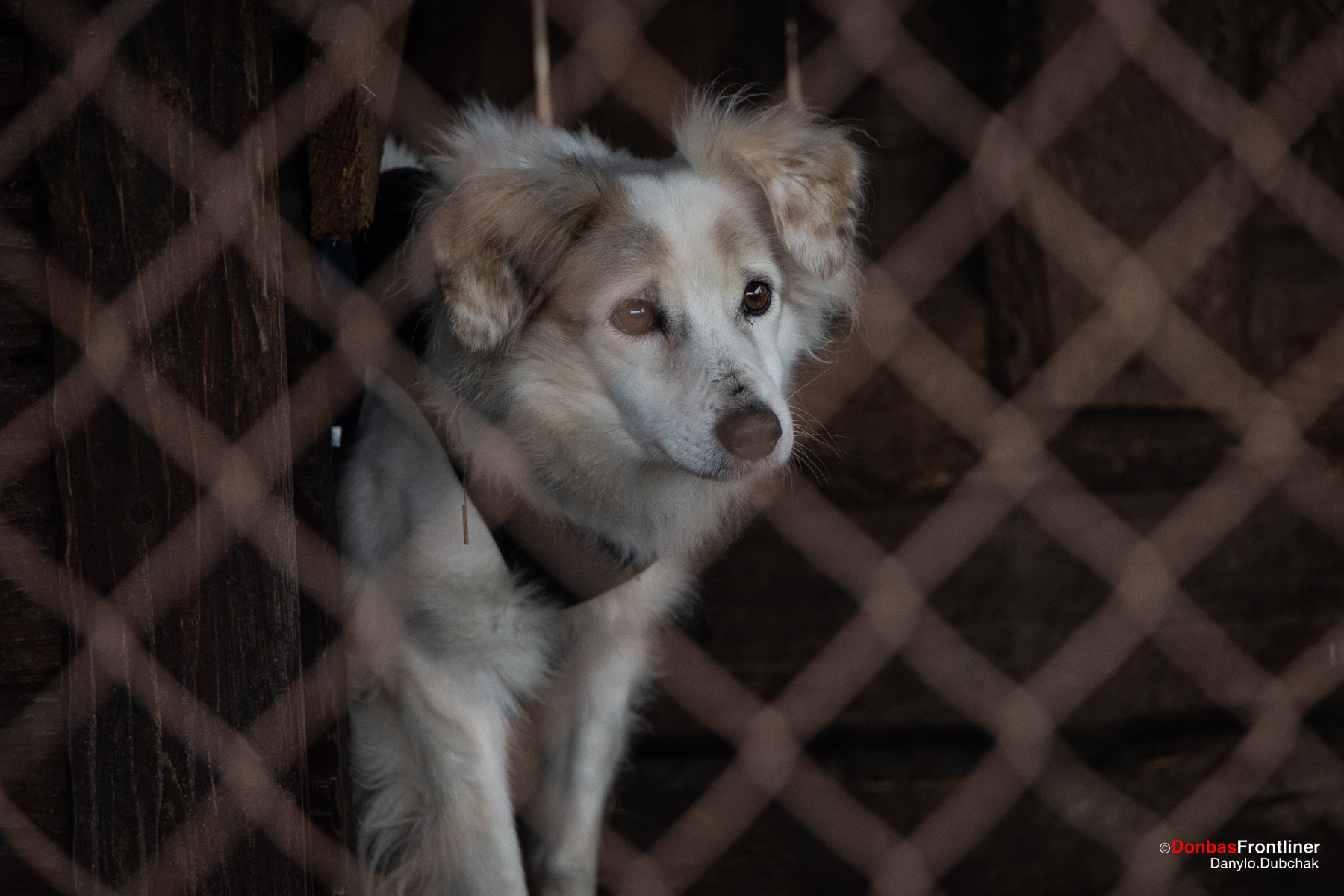
She points to the stack of pallets—they are collecting them for the 71st separate fighter brigade now fighting at Bakhmut. Oleksandra’s ex-husband is also there. “We help these guys a lot,” she says, “We are friends. They’ll be pulling out to recover soon, and they are going to build a pet playground out of these pallets. So we made a call for donations.”
Oleksandra’s family broke up because of her commitment to the shelter. But after the new phase of the war began, she and her husband started communicating again.
Her son is a great help.
“My son has given up his studies. He lives in Germany. He and his wife started fundraising,” she says. “Thanks to him, his German wife, and House of Animals, a Dutch foundation, we have the opportunity to build enclosures, buy food and construct the frame of the cat house. I appreciate their help. I have a wonderful son and daughter-in-law! I have a friend just as wonderful as she is. I am now friends with my ex. Before the war, we sold our apartment, split the money, and stopped communicating. But now we have a wonderful connection. He did not expect me to stay under occupation. My son and I helped his unit buy a car and NATO-standard winter gear… In short, we are in touch every day.”
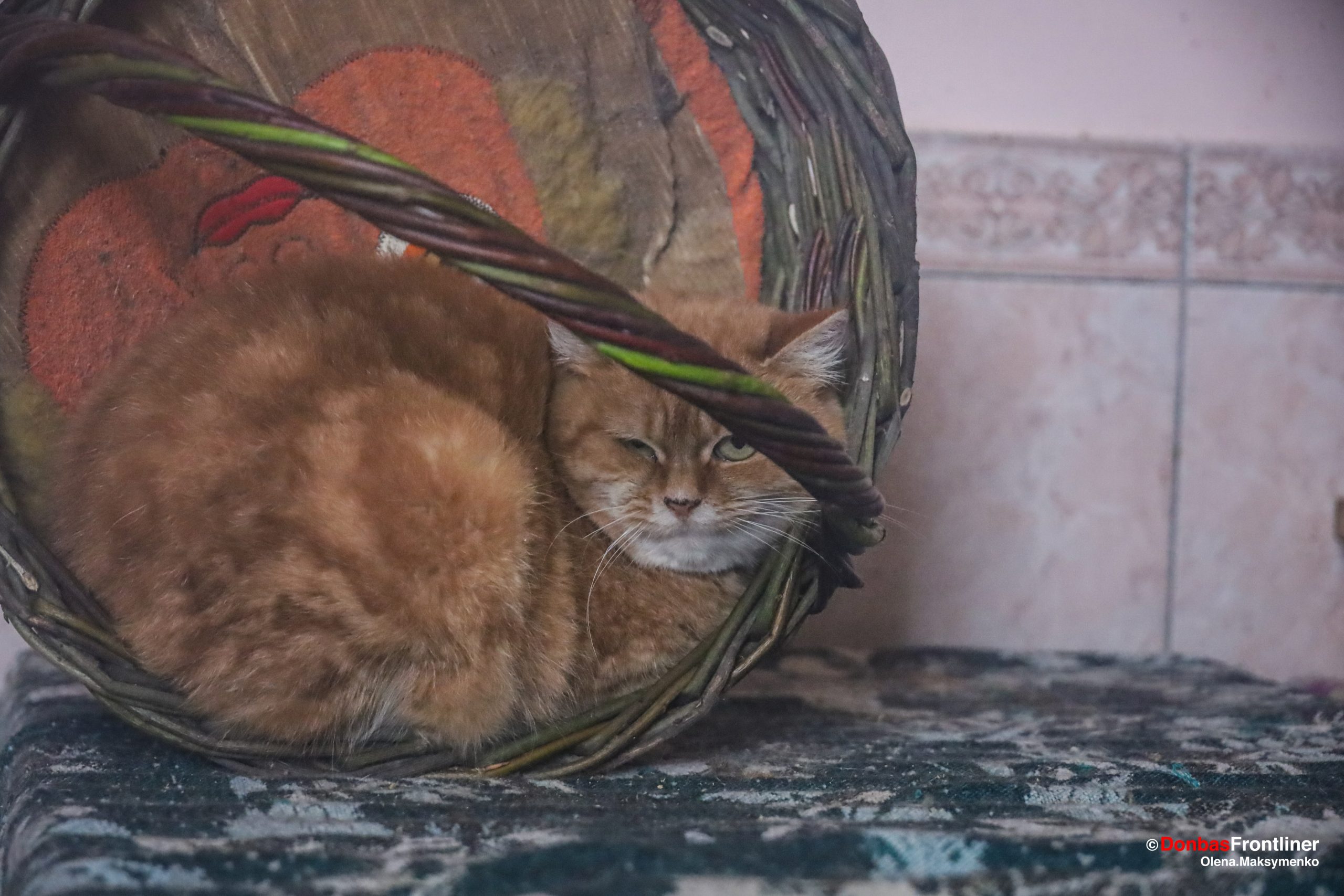
Fifteen workers are enough to feed the animals every day. They clean up every other day. On weekends, when the volunteers arrive, activity at the shelter is in full swing. There are no days off. The employees usually work for a month and then have ten days off.
“Someone comes here for several months,” says Oleksandra. “Others live at the hostel all the time because their living conditions at home are worse than here. We have hot water and heating.”
Wheat porridge is cooked in the ovens under the roof. ‘Lunch’ is prepared in a bathtub next to the ovens. Every day they cook 500-600 kilograms of meat. Some of the animals eat only dry food.
“Dry food is much easier, of course, but it is insanely expensive,” the owner explains. “So it’s feeding time from morning to night. Giving the animals food and water is our top priority, and only then, unfortunately, comes cleaning. We pour the mash into the tub, mix it with the broth and anything else we have, and that’s it.”
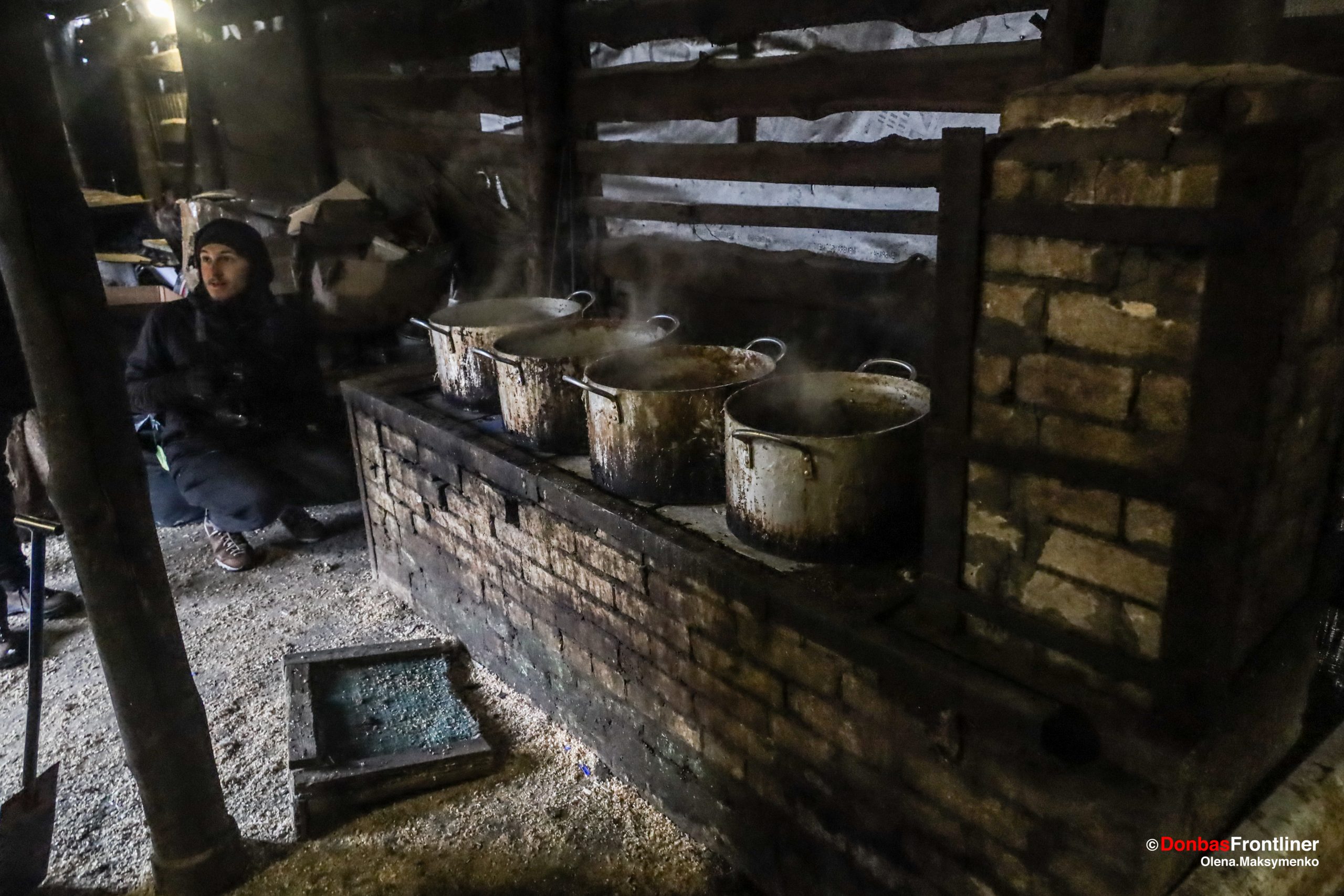
Staff members check on the animals when they are fed and act immediately should they notice a problem with the animals’ health. They can do most of the basic things by themselves. There are plenty of medications here and even an oxygen machine. If the problem is serious, they take the sick animal to the animal hospital, which gives discounts to the shelter. They have not been able to hire a full-time vet because working at the shelter is not the same as working in a clean office at a clinic. During the summer, vets came from Canada, Germany, the United States, and Uruguay to help the shelter. Four Paws, an international animal welfare organization, also came twice.
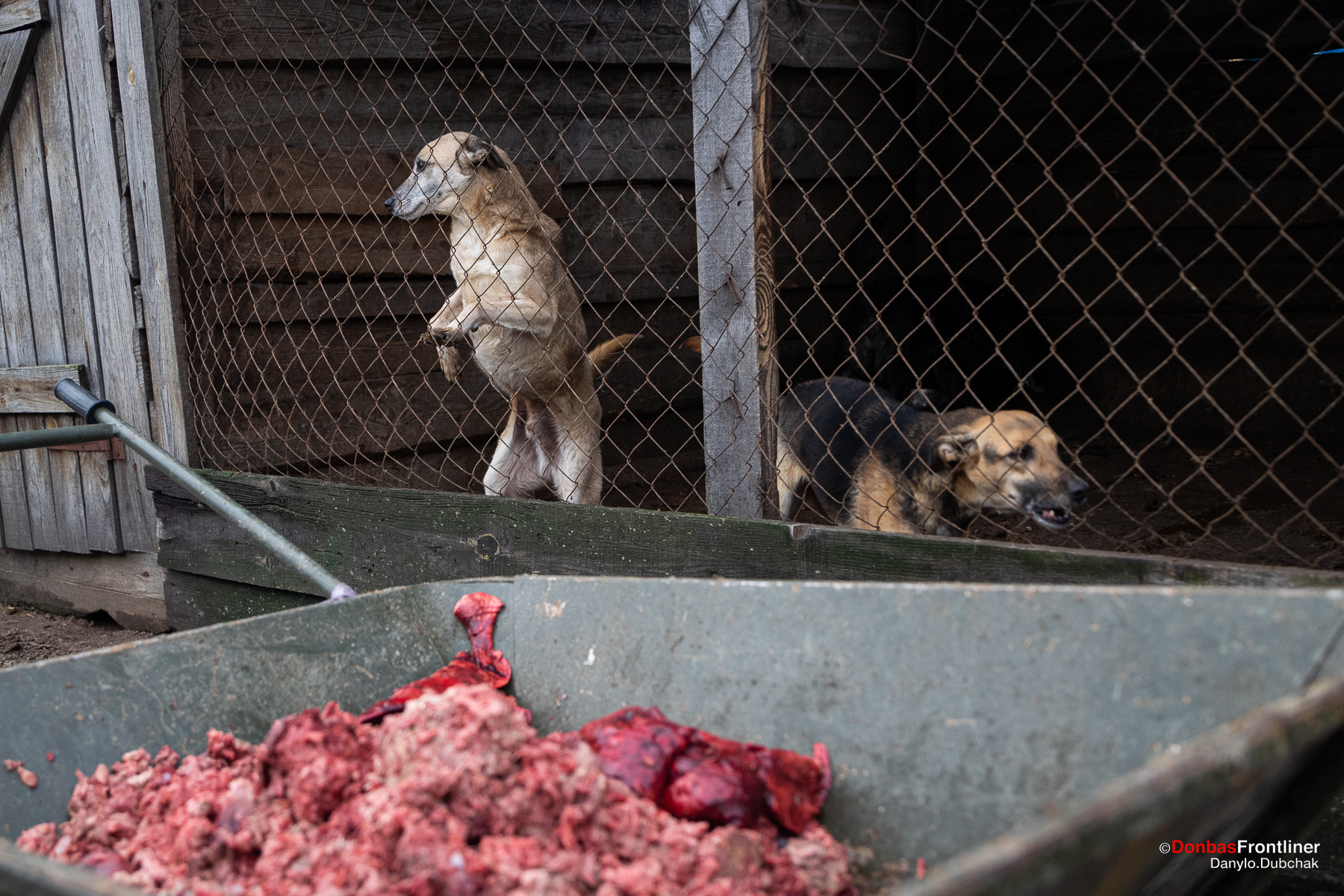
Due to the lack of time for maintenance, a pond on the grounds of the shelter has almost turned into a swamp. But after the victory, the plan is to restore it and make it a recreation area for volunteers.
“Our dogs used to swim here,” Mezinova recalls with a laugh. “Along with the volunteers. But the volunteers did not really do it voluntarily. They would go for a walk with a Staffy, and the next moment you would see them in the pond… With the Staffy.”
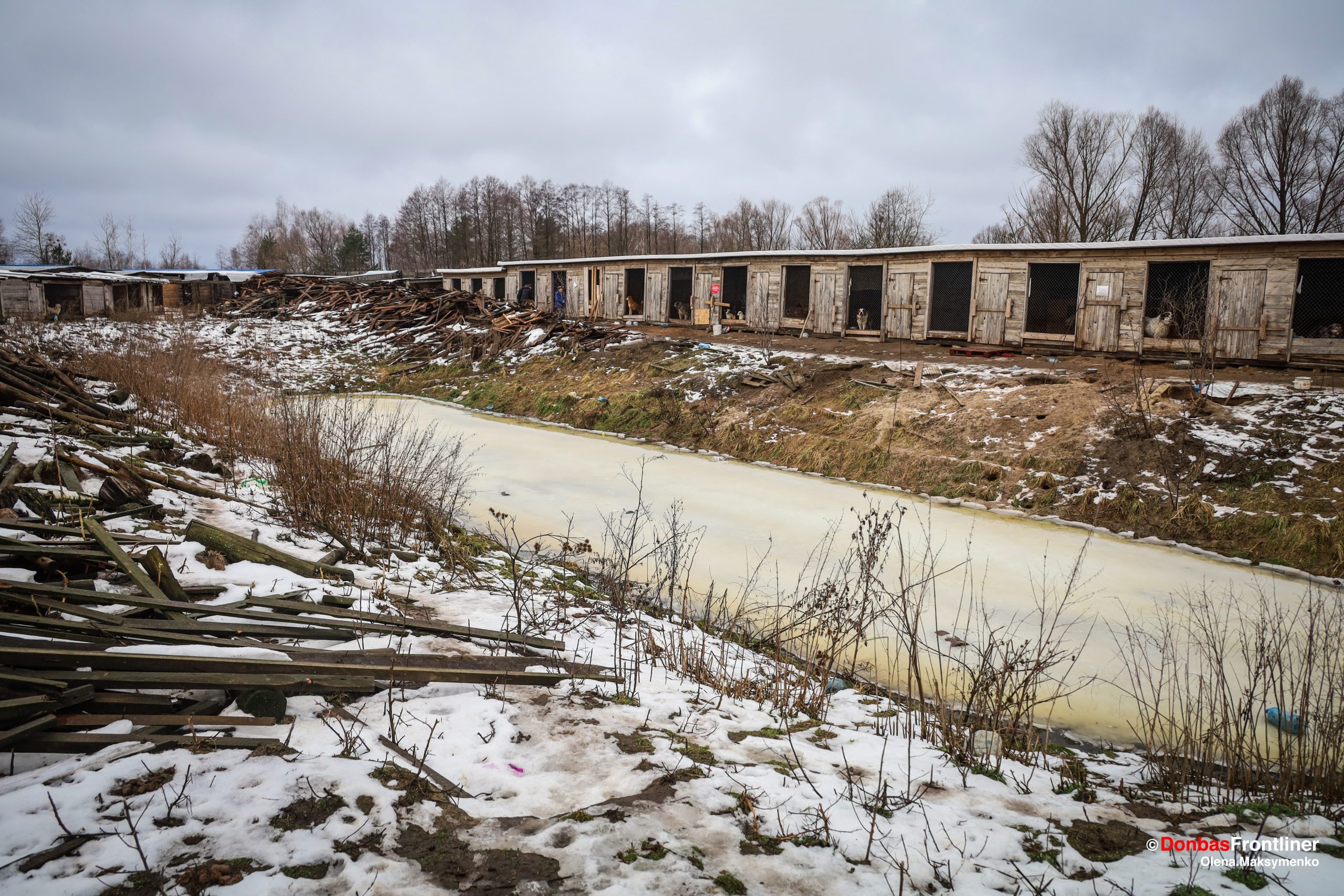
At the best of times, entire companies would come to Sirius to volunteer and help with the cleanup. They also organized lessons of kindness for children from schools, kindergartens, and orphanages. Children from Donetsk and Luhansk regions visited the shelter at the beginning of the war. Spending time with the animals was a kind of rehabilitation for them.
“You see children who come here so bitter and unhappy, children from first to tenth grade…” the owner recalls. “And when they leave, they want to take a picture with you, they hug you and say they’ll be back to adopt a pet when the war is over! At first, I always wore sunglasses, even when the sun was not shining. I always had tears in my eyes, it was just impossible. Thank God the children could at least rest a little. They would sit down, and the cats would be all over them, and then the teacher would say, ‘Come on, get up, let’s get some water, let’s do something for the shelter!’ And I would say, ‘Let’s just leave them alone. I can feel them relaxing!’”
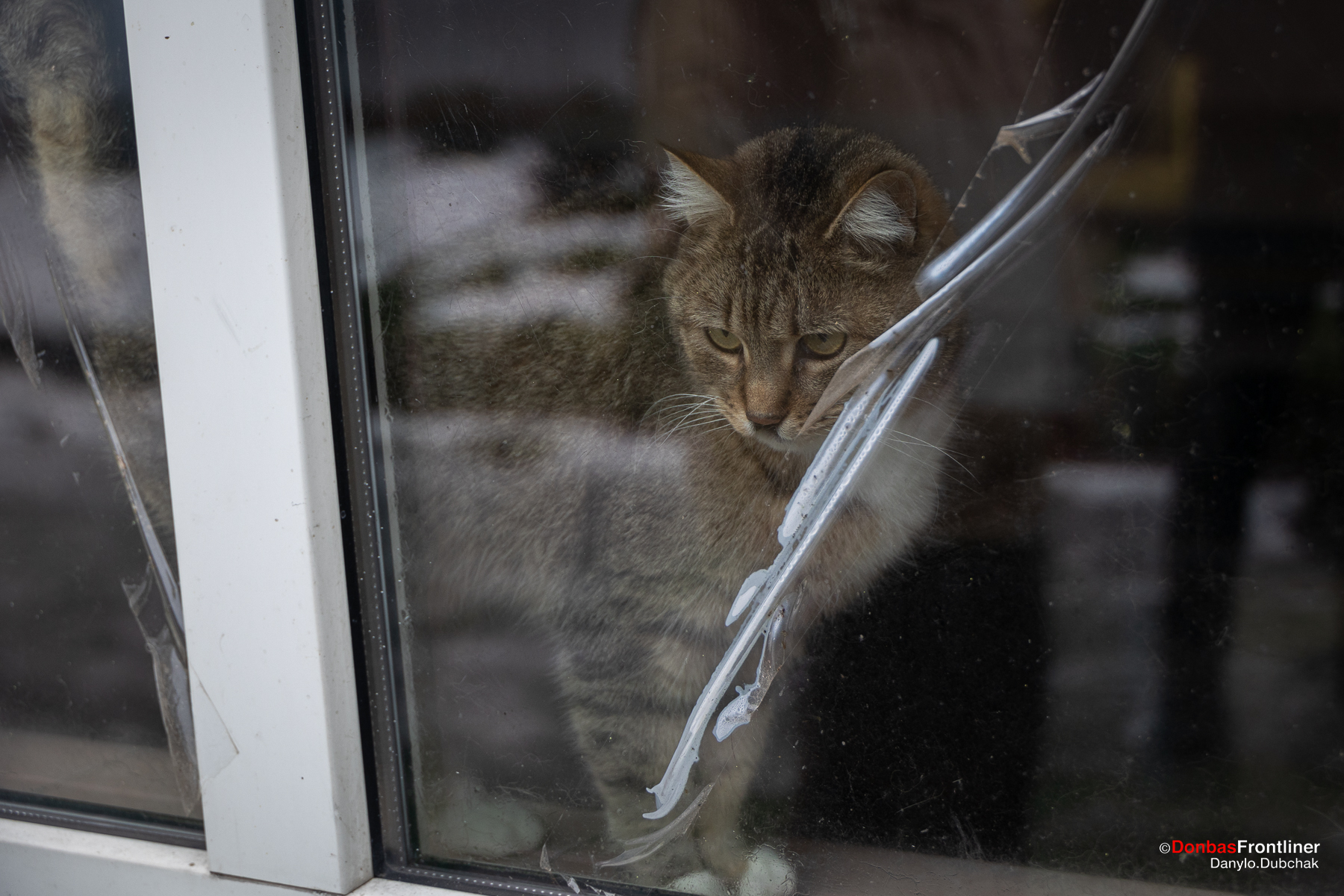
They are also planning to build a rehabilitation center for war veterans and another for children.
The shelter is preparing for a possible attack from the direction of Belarus, stockpiling food and neutering the animals. However, Oleksandra believes that the Russians will not be able to occupy the Kyiv region again. “We are friends with the guys from the military units, and I doubt the Russians would go through with this scenario. Justice must prevail. I am an optimist, as you might imagine seeing our shelter! We will remember this all as a nightmare. I just hope it turns into a memory sooner!”
Text: Olena Maksymenko
Photos: Olena Maksymenko, Danylo Dubchak, Nikita Hryva
English translation: Hanna Leliv
Матеріал створено в рамках проєкту «Життя війни» за підтримки Лабораторії журналістики суспільного інтересу та Інституту гуманітарних наук (Institut für die Wissenschaften vom Menschen)